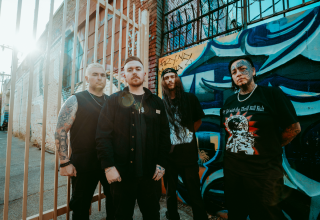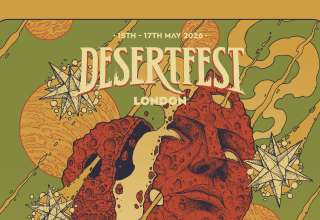Review & Photography by Manny Manson for MPM
Gatecreeper
It begins long before the house lights dim and the crowd files into The Halls in Wolverhampton, before the sweat and stomp and roar, before the guitars snarl and the mic cable whips like a lasso caught in a desert wind.
Gatecreeper’s story has always been about carving a place out of heat-warped highways and bleached American ruin; a band born in the Arizona furnace, formed in 2013 when Chase “Hellhammer” Mason first started barking his way through the filth-caked death metal underground. They rose through sweat-stained clubs and dusty punk rooms, grinding on a steady diet of HM-2 buzzsaw grit, hardcore swing, and doom-soaked decay until the world began to take notice. And tonight, as they stride out to open this Wolverhampton bill, you can feel that story in every stomped kick drum and every serrated riff, a sense that the desert dirt is still stuck in the grooves between their knuckles and strings.
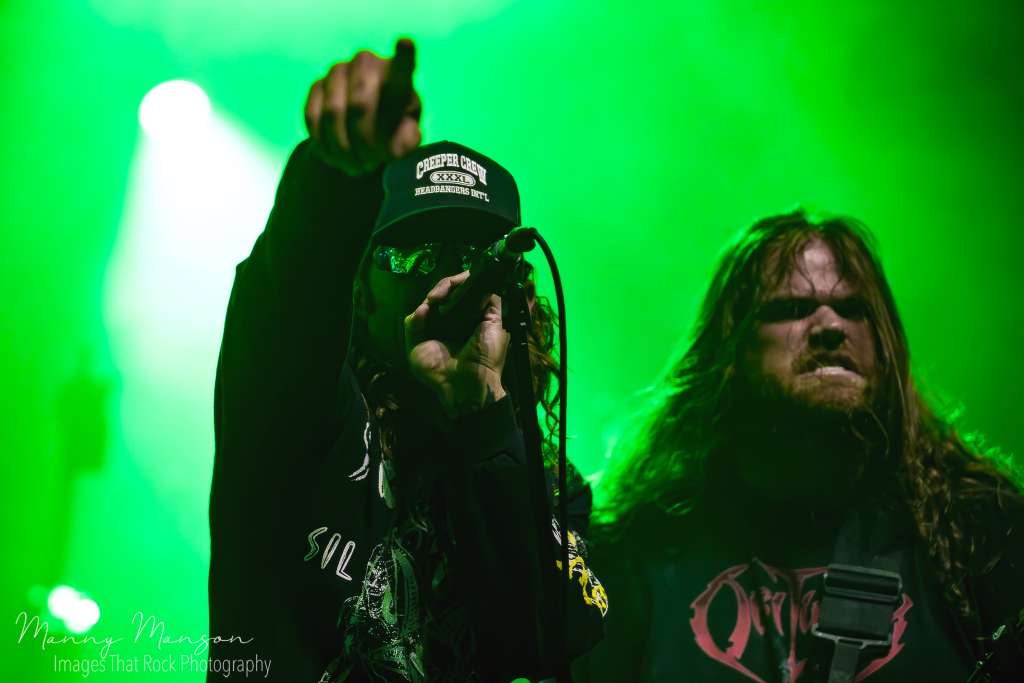
No speeches, no theatrics, just an eruption. Dead Star hits like a slab of concrete dropped from the sky, the HM-2 tone from Eric “The Darkest Cowboy” Wagner’s guitar hitting the air in a vile swarm of grit. He stands like a gunslinger from some cursed western, hair flying, fingers tearing across the fretboard. The band has always understood mood as much as muscle, and Dead Star, off Dark Superstition, feels like a funeral march through supernatural shadowlands. Mason’s roar, equal parts cavern and knife-edge, tears through the room as Israel Garza locks in with him, his rhythm guitar thick as tar, building a suffocating wall that bassist Alex Brown glues together with tone like concrete dust in your teeth. Matt Arrebollo’s drums slam with that trademark Gatecreeper stomp: a lurch, a grind, a swing that invites violence but also commands discipline. There’s no sloppiness here, this is precision brutality, road-hardened and sharp.
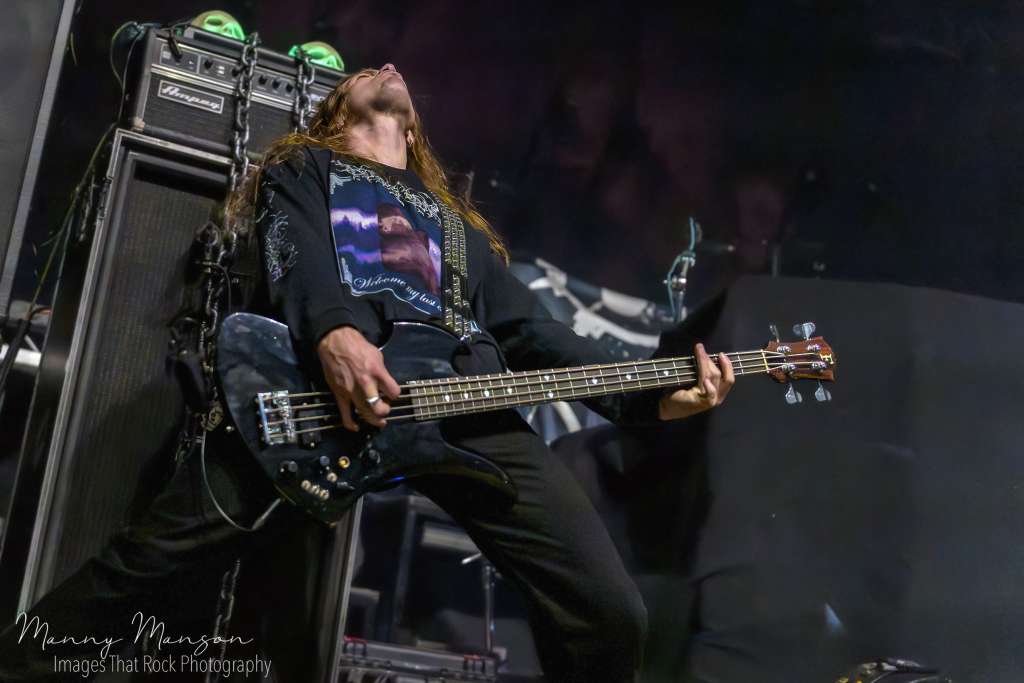
Ruthless follows and suddenly the room shifts from dread to punishment. From Deserted, it’s pure stomp-and-tear death metal, the kind of song written to shake drywall loose. Live, it becomes a battering ram, Mason barking each line like he’s spitting out broken teeth, Arrebollo driving double-time sections like a tank engine chewing gravel. You see the band’s hardcore roots here, the years playing basements and DIY shows, that ability to turn a crowd into a living, breathing riot. Wolverhampton doesn’t need a second invitation; the pit churns, elbows fly, and every instinct Gatecreeper ever sharpened in the desert ignites the room like petrol on cracked asphalt.
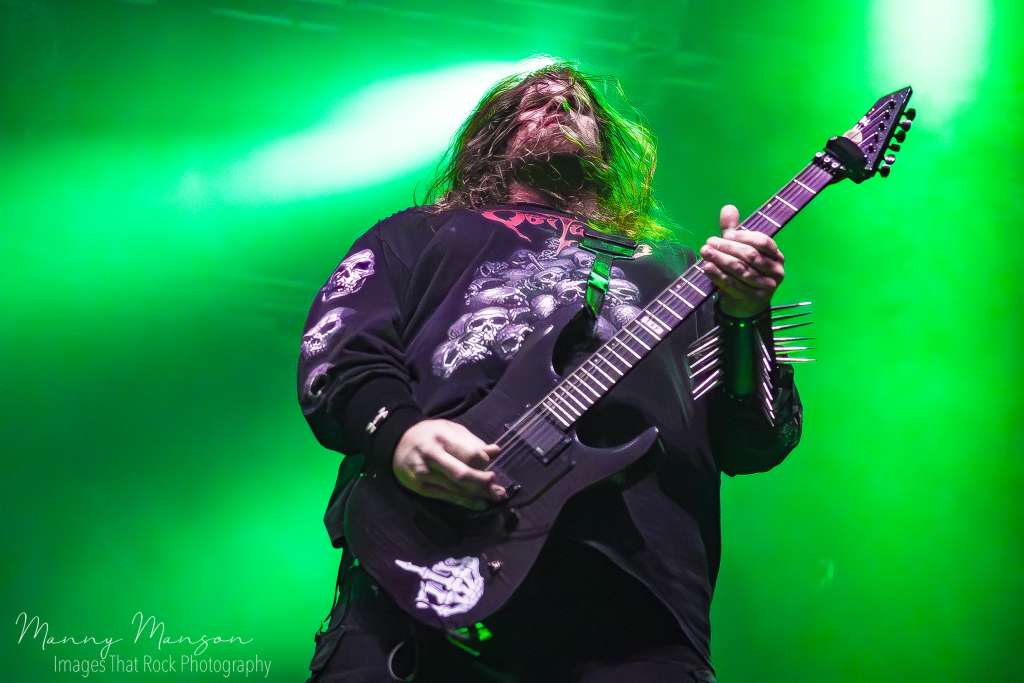
A Chilling Aura oozes in next, and with it the supernatural melancholy that defines their recent chapter. Dark Superstition is a record haunted by forces seen and unseen, loss, ghostly dread, the feeling of being stalked by the unseen, and here those themes pulse like a heartbeat under the distortion. Wagner bends notes like they’re trying to escape, Garza and Brown dropping into a slow-crushing groove that feels like trudging through a haunted wasteland. When the chorus riff hits, it’s like being swallowed by fog that has teeth. Mason doesn’t scream so much as channel something, the possession theme that runs through their latest album bleeding through, his eyes wild, stance wide, a preacher of doom rather than just a death metal vocalist.
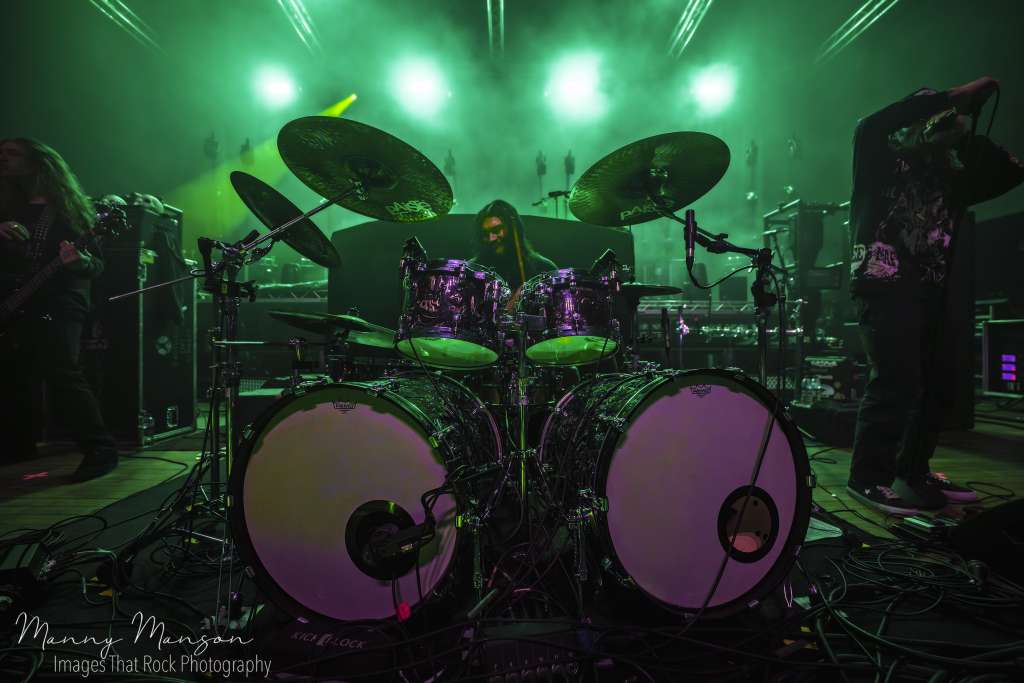
Caught in the Treads explodes like a sand-caked war engine kicking into gear. Again, from Dark Superstition, but with the punk venom that marked their early EPs, it cuts through the room like barbed wire dragged across bone. Arrebollo’s drums clatter and swing, Brown’s bass clings to the low end like rust welded to steel, and suddenly it’s not Wolverhampton anymore, it’s an industrial graveyard, engines grinding, flesh and machinery intertwining. Gatecreeper always had that old-school Bolt Thrower swagger, but live it’s dirtier, more frantic, primal.
Then The Black Curtain creeps over the crowd like smoke slipping under a locked door. The eerie melancholy from the new record settles in like a slow fog. Wagner and Garza layer riffs like gravestones leaning in the dead air, and it’s here the doom influence shines brightest. Gatecreeper learned long ago that heaviness isn’t only in speed; it’s in weight, tension, decay. Mason’s voice stalks the stage, low and menacing before erupting into a gnarled roar. The chorus crushes like a church collapsing under centuries of rot, a haunting, occult-drenched picture of dread.
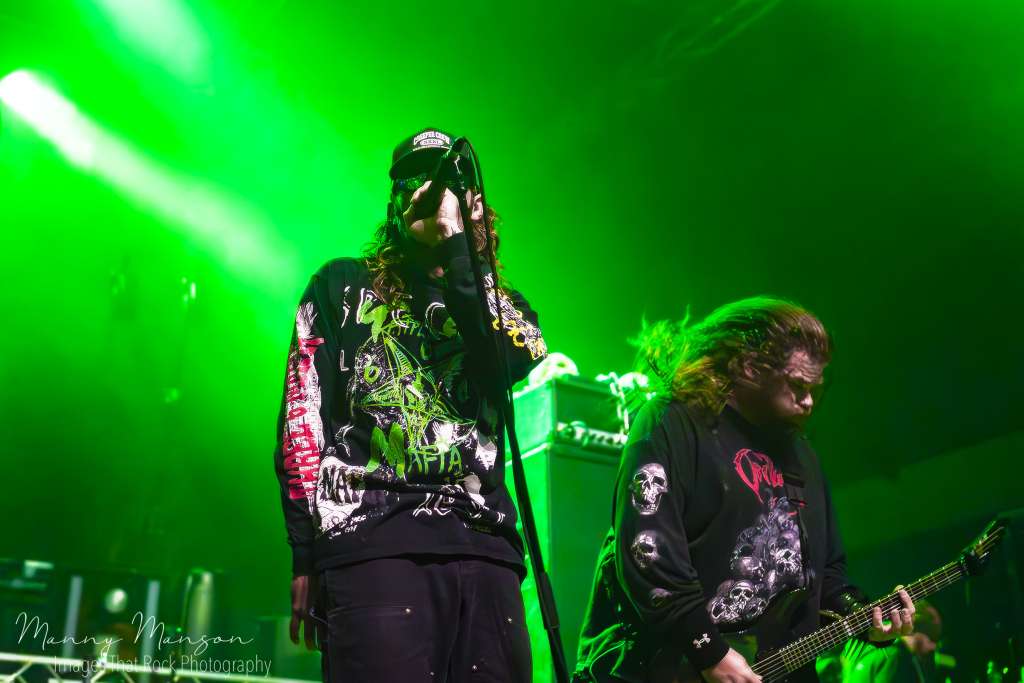
From the Ashes snaps everyone back to pure metallic violence. The Deserted era lives in songs like this: triumphant yet feral, the sound of clawing upward from the graves of lost bands and forgotten scenes. There’s defiance in every drum strike, a chest-beating pride born from years of grinding across continents. When the breakdown slams, it feels like catharsis, Wolverhampton answering back with raised fists and flailing limbs, the floor trembling, sweat flung from every body in motion. Gatecreeper don’t just play; they command.
Mistaken for Dead follows like a vengeful spirit. The ghostly theme returns, death and identity dissolving, the psychological dread baked into Dark Superstition’s DNA. Wagner’s leads drip with cold melancholy, notes hanging like souls stuck between worlds. Brown and Garza lock into a low-end lurch that could level buildings, Arrebollo hammering through blastbeats and swamp-thick stomps with brutal fluidity. Mason leans forward, gripping the mic like he’s strangling it, voice cracked and monstrous as he conjures images of being erased, forgotten, doomed.
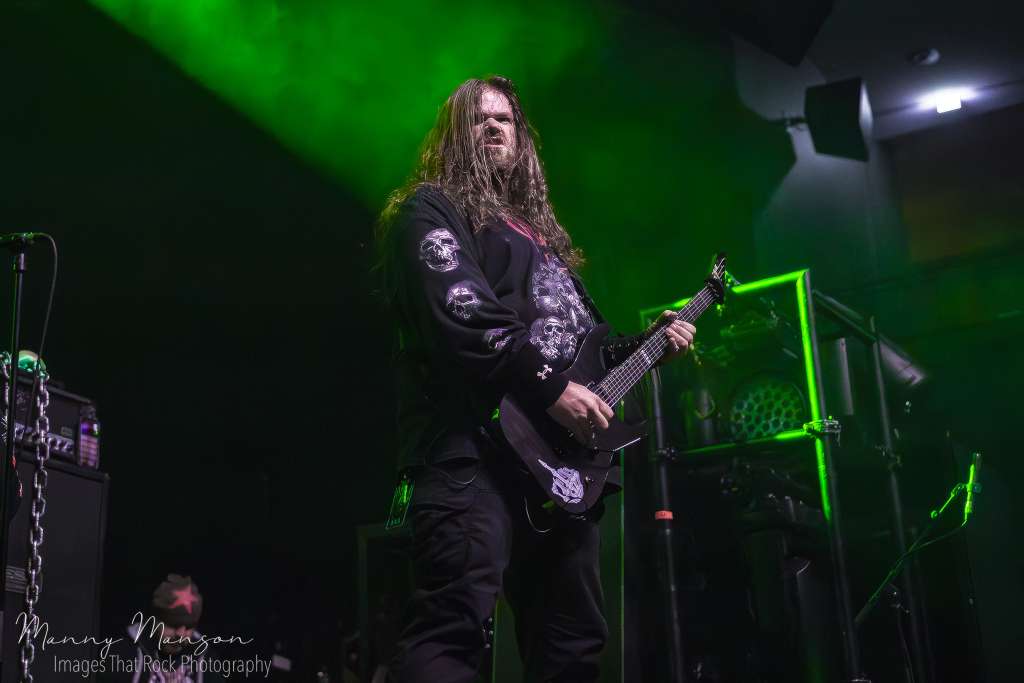
Then Flesh Habit, filthy, grinding, primitive in its stomp. This one feels like being dragged face-first across hot concrete. It’s addiction and compulsion turned into riff-form, the band sounding like a machine with blood in its gears. Wagner’s guitar snarls with that trademark chainsaw tone, a tribute to the Stockholm forefathers but always with that American grime layered over it, a fusion they forged through sweat and survival.
Sick of Being Sober comes in like a street fight, that hardcore punch they honed on An Unexpected Reality. Fast, pissed off, raw, it turns the room feral. No frills, no mystique, just pure self-punishment and catharsis. Mason paces the stage like a man stalking demons both internal and external, spitting venom as the band tears into the most punk-inflected blast of the night. It’s a reminder that beneath the occult shadows and doom trudge, Gatecreeper are still desert-born fighters, beer-stained, scar-mouthed, and battle-ready.
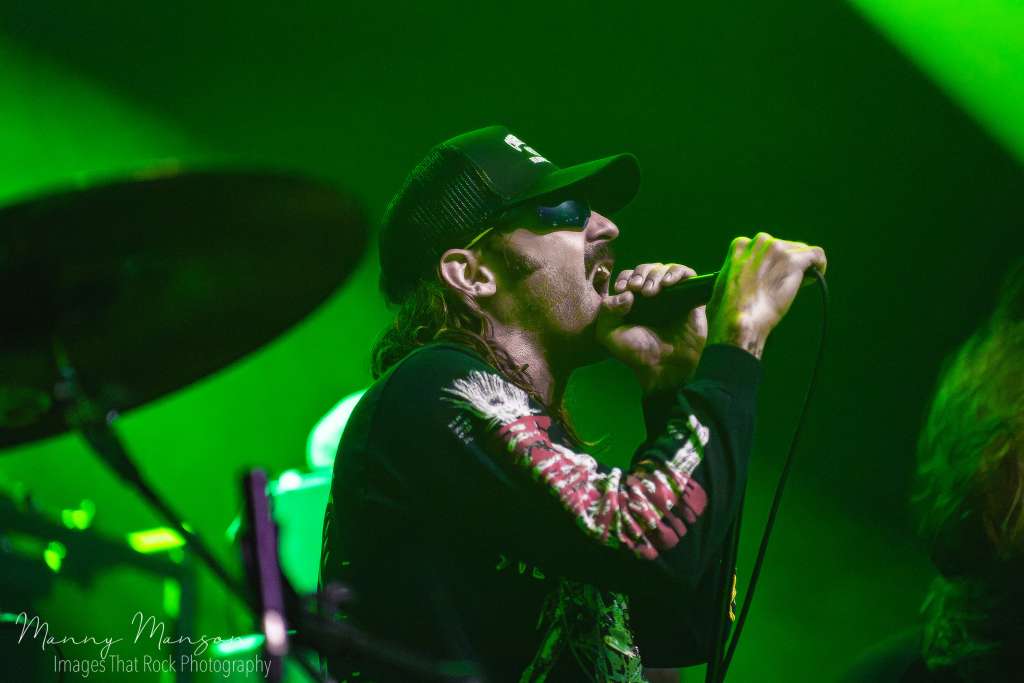
And then they end with Flamethrower, the earliest era flaring like a torch tossed into gasoline. Sonoran Deprivation was the statement of hunger; tonight, the song becomes a victory lap soaked in grit and blood. Wagner’s riffs slice like rusted machetes, Garza and Brown pounding out the low-end with bulldozer force, Arrebollo smashing the kit as if every drumhead owes him money. Mason roars like a man exorcising the ghosts of every desert night, every tour-van breakdown, every dive bar stage they destroyed on the way here.
No goodbye. No tidy wrap-up. Gatecreeper leave the stage the same way they built their career, by force, by grit, by walking off like they’ve still got miles to go and battles to fight.
And as Wolverhampton wipes the sweat from its brow and the amps cool like dying engine blocks, the sense lingers:
Gatecreeper aren’t just a band, they’re a storm rolling out of the desert, haunted, hungry, and still rising. Tonight wasn’t an opening slot. It was a warning. A declaration. A grave dug deep, with room for anyone who doubts them. The halls shake. The pit exhales. The darkness tastes like dust and adrenaline.
Gatecreeper came. Gatecreeper conquered. And they will be back, hungrier, heavier, and even more unstoppable.
Eluveitie
If Gatecreeper were the scorched earth and blast furnace heat of the underworld, Eluveitie step into Wolverhampton like mist rolling down off forgotten mountains, ancient as root and stone and bone, carrying with them centuries of memory, and suddenly the air feels colder and heavier, as if the room itself understands something older has entered. Founded in 2002 by Chrigel Glanzmann, not as a mere band but as a resurrected culture, Eluveitie have always stood apart.
Their music has never been fantasy, but archaeology set to melody, a revival of the Helvetii and Gaulish world erased by empire, where guttural screams and shimmering folk lines are not aesthetic choices but a reclamation of language, myth, grief and fire. Where most metal bands sing about the ancient world, Eluveitie speak from inside it.
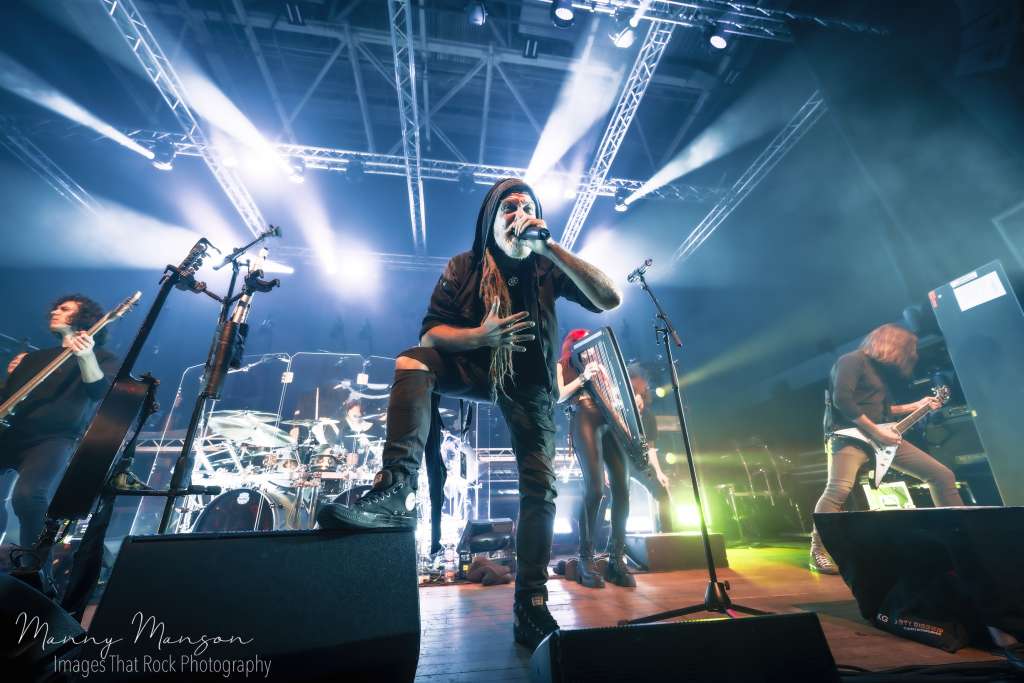
The lights dip gold, hurdy-gurdy drone curling like smoke from a ritual pyre, and Lee Sophie Fisher’s bow moves with a priestess’ poise as Ategnetos wakes, soft first — flute-like breath, low drone, then the sudden sharp edge of distorted guitars and drums cracking like shields clashing. Grigor Klansman stalks the mic like a war herald of forgotten tribes, his roar not simply aggression but invocation; opposite him, Fabien Ernie raises his voice like sky breaking after storm, the eternal Eluveitie duality in human form: rage and reverence, war cry and prayer.
Raphael Salzmann’s lead lines arc like runes etched into stone by torchlight, while Jonas Wolff and Kay Brem lock the earth beneath him, bass and rhythm guitar thick and ancient, and Alain Ackermann drives the entire band with the cadence not of a metal drummer but of a ceremonial drummer calling warriors to gather. Eluveitie don’t open sets; they unfurl epochs.
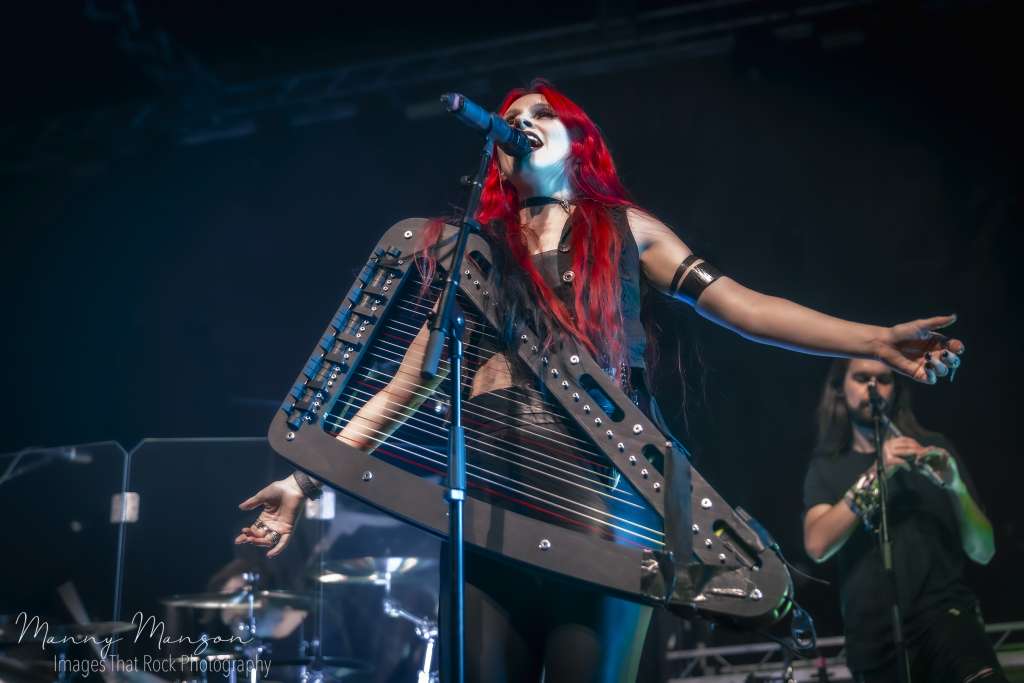
Deathwalker arrives like cavalry thundering over frozen ground, Fisher’s melodies weaving through the heavy riffs like spirits darting between charging bodies. Eluveitie’s brilliance has always been rooted in contrast, not softness versus brutality, but the grace of a dying world set against the fury of its defenders, and Grigor and Fabien trade lines like two voices of the same myth, mortal anguish answered by divine lament. Their history informs every riff and scream; Glanzmann built this band to resurrect the forgotten Gaulish tongue, to honour the slain and displaced, to let a culture speak again through distortion and ancient wood. The crowd doesn’t merely listen, they lean forward, drawn into something half-remembered, half-dreamed, wholly alive.
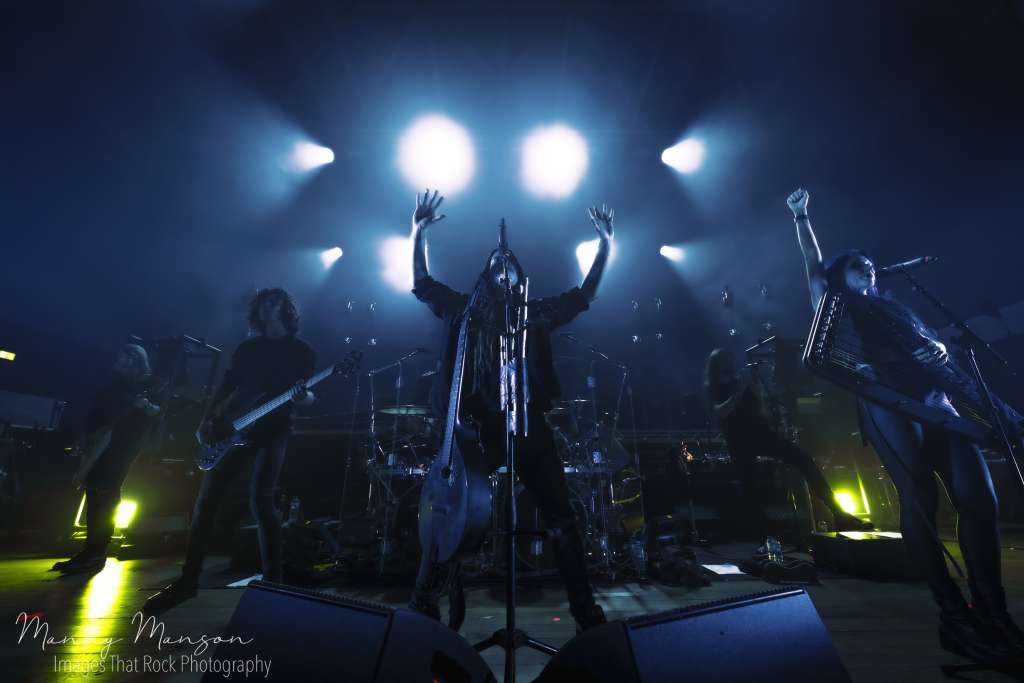
Then comes The Prodigal Ones from Ànv, a record born from the idea of rebirth through suffering, cyclical death and renewal baked into the soil of European myth. Fabien’s voice floats like smoke from sacred groves, sorrowful yet shining, while Fisher cuts through with violin lines that ache like longing carried through centuries. It feels less like a concert and more like a pilgrimage in sound; the guitars build in slow defiance until Grigor tears through the serenity with a scream weighted in ancestral grief, as if channeling voices who once resisted erasure. Eluveitie’s music remembers what history tried to bury.
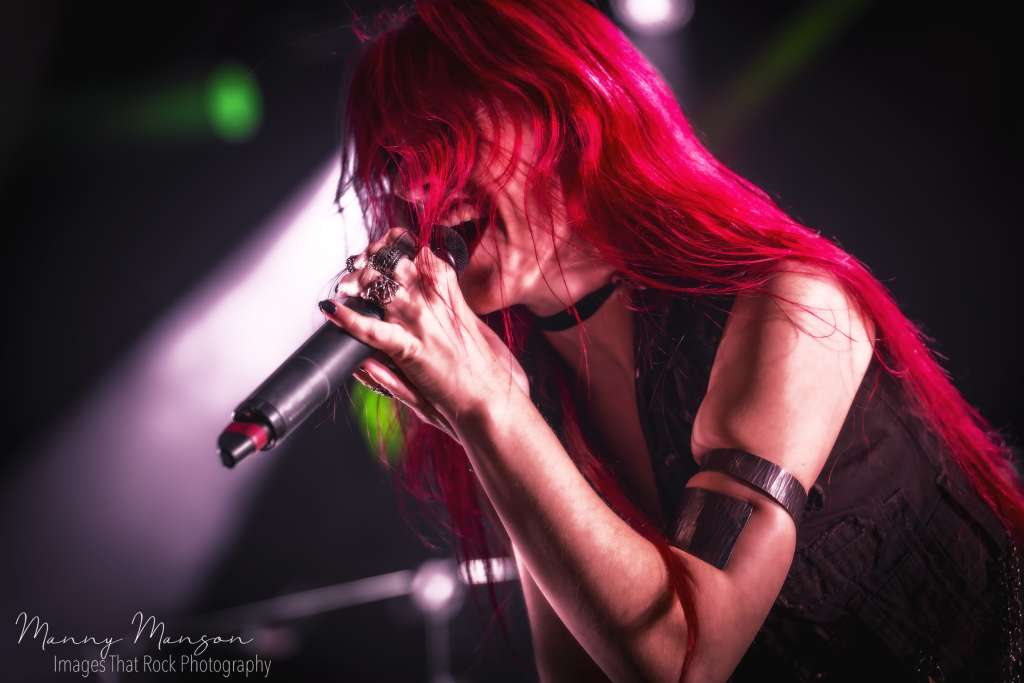
Exile of the Gods follows with that crushing realization that when gods vanish, mortals bear the wounds alone. Ackermann’s drums thunder beneath swirling folk motifs, and the band moves with powerful unity, a single living organism. The pit becomes not violence but ritual motion, bodies swaying like a tide under torchlight. The band’s twenty-plus years on the road shows in how effortlessly they command space, no theatrics, just authenticity sharpened to a blade.
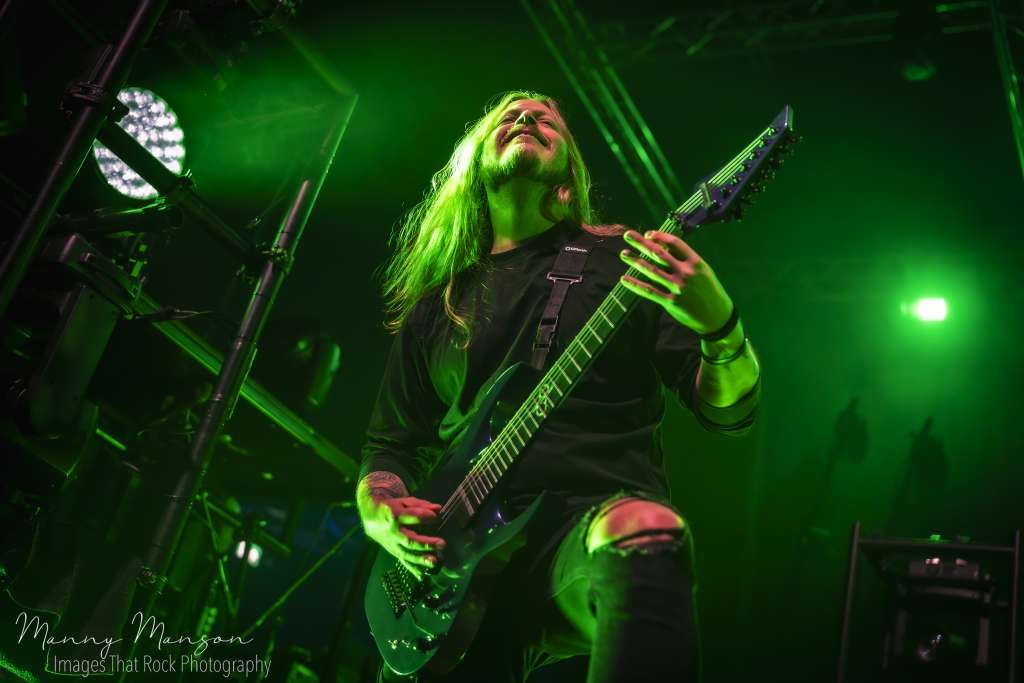
And then the atmosphere shatters into fragile beauty as A Rose for Epona spills into the room. Wolverhampton falls still. Even those unfamiliar with the band’s lore understand instinctively, this is grief given voice. Fisher’s violin sings first, raw and trembling, followed by Fabien, his voice cracked open by loss that feels older than any one lifetime. Written from the perspective of a Celtic woman abandoned by her gods, the song aches with abandonment, quiet devastation and the fury of the forgotten. When Grigor erupts midway, the reaction is visceral; it is not metal rage but existential cry. There are people here with tears in their eyes, and nobody dares mock it. The beauty is too real.
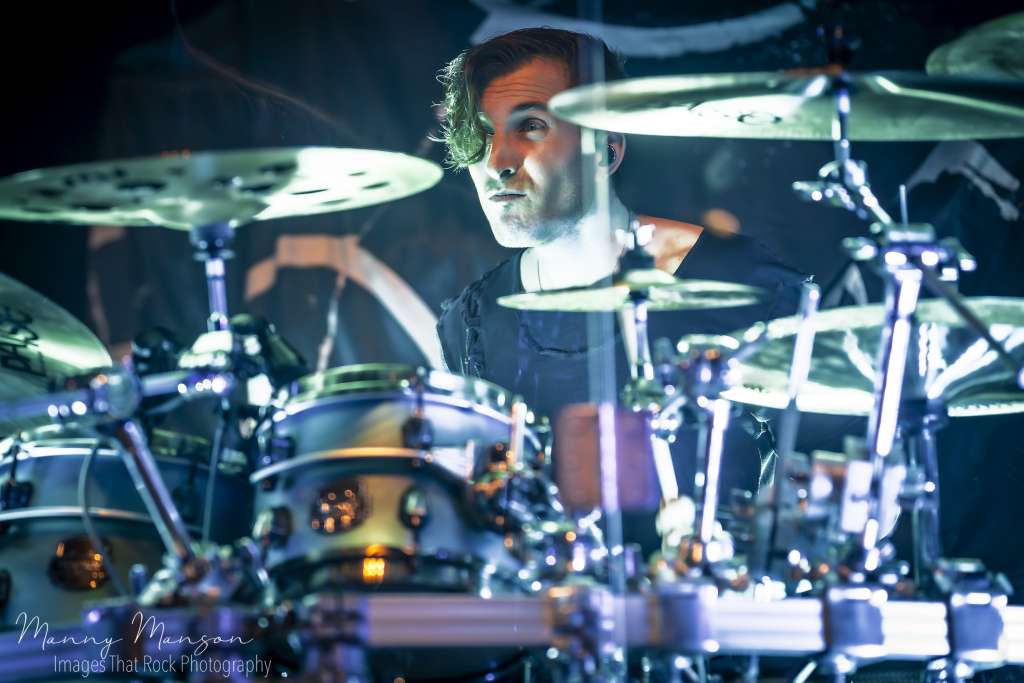
Premonition swirls in on hurdy-gurdy drone like the sound of time breathing. The tension rises, slow and deliberate, until the dam breaks and the band floods forward in a wave of death metal ferocity wrapped in folk mysticism. This has always been Eluveitie’s secret, history as blade, sorrow as armour, melody as weapon. Even their heaviest moments feel like ritual rather than aggression, as if each downstroke carves another glyph into the air.
Abriramus brings the earthy stomp of Ategnatos, tribal and grounded, the sound of feet pounding mud into paths where legions once marched. Brem and Wolff hold the centre like granite pillars while Fisher switches between mournful bow sweeps and furious hurdy-gurdy churn, turning breath and wheel into something spiritual. The pit moves again, but it feels celebratory now, like bodies honouring something sacred in motion.
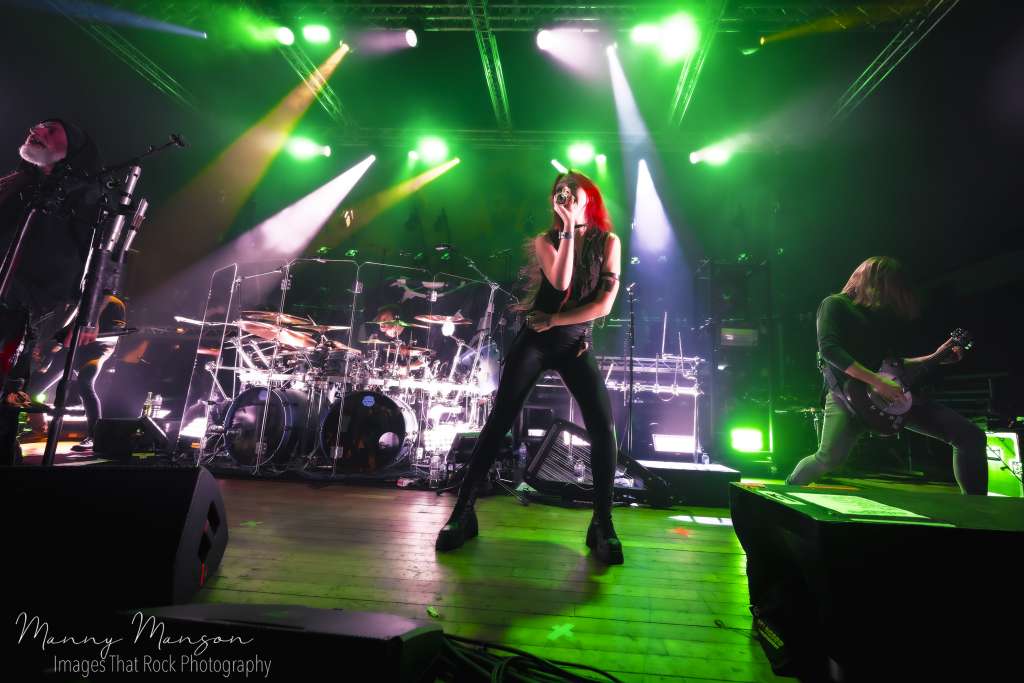
L’Appeal des Montagnes comes like firelight dancing off stone walls, a rush of folk exuberance layered atop relentless rhythm. Smiles flash between the band; this is the moment the solemnity breaks, the feast after sorrow, the dance after war. Arms lift, bodies spin, and the ancient world feels joyful again, wild and alive rather than mourned.
King returns us to grandeur, regal and storm-crowned. Fabien stands tall and clear-voiced, channelling a ruler forged by struggle and fate, before Grigor crashes through like the primal king of the woods, teeth bared, earth under fingernails, and Salzmann’s lead arcs over everything like a banner snapping in mountain wind. This is myth carved into sound, not with pomp but with raw sovereignty reclaimed.
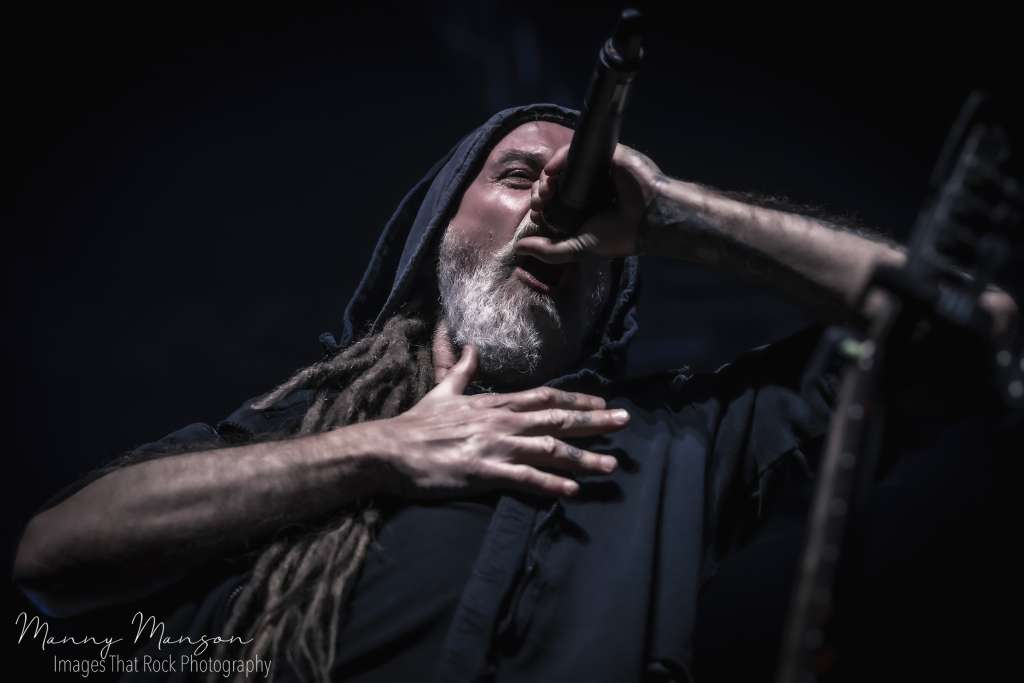
And then, the inevitable rising hum, that unmistakable drone, violins lifting like dawn mist, and the first melody of Inis Mona rings out. The response is immediate and explosive. It is not a song anymore; it is a hymn. The crowd roars every word, some with fists high, some with eyes closed like they are praying in a language they never learned but somehow remember. Fisher turns circles with her instrument, bow flying like a flame dancer, Ackermann drives the beat with triumphant fury, and Eluveitie explode with the force of a culture resurrected in real time. Wolverhampton becomes a Celtic valley at twilight, thousands of voices rising in one united cry, and when the final note fades it feels less like the end of a song and more like the closing of a sacred gate.
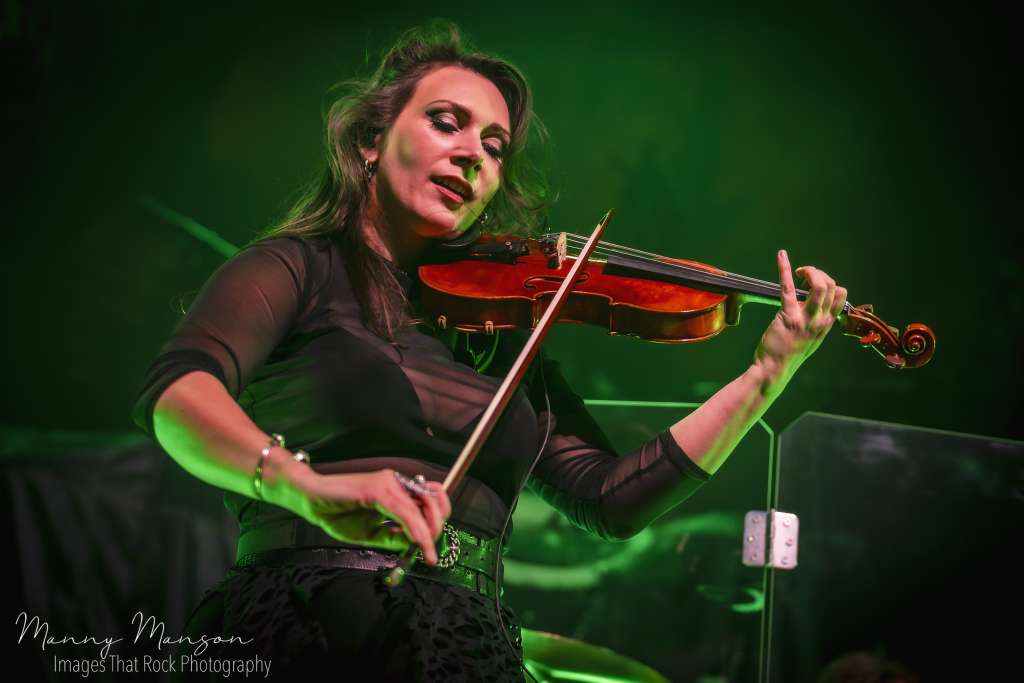
Eluveitie walk off not like rock stars but like spirits receding into mist, and the air hangs charged, history humming in the bones of everyone present. What lingers is not applause, not adrenaline, but the strange quiet feeling you get when you’ve stood in a place where time bends and memory breathes. Two bands in, and the night has already spanned continents and centuries.
Gatecreeper gave the fire and the grave dust, Eluveitie gave the myth and the blood-memory, and the walls of this old hall now feel like they’ve witnessed something far older than themselves.
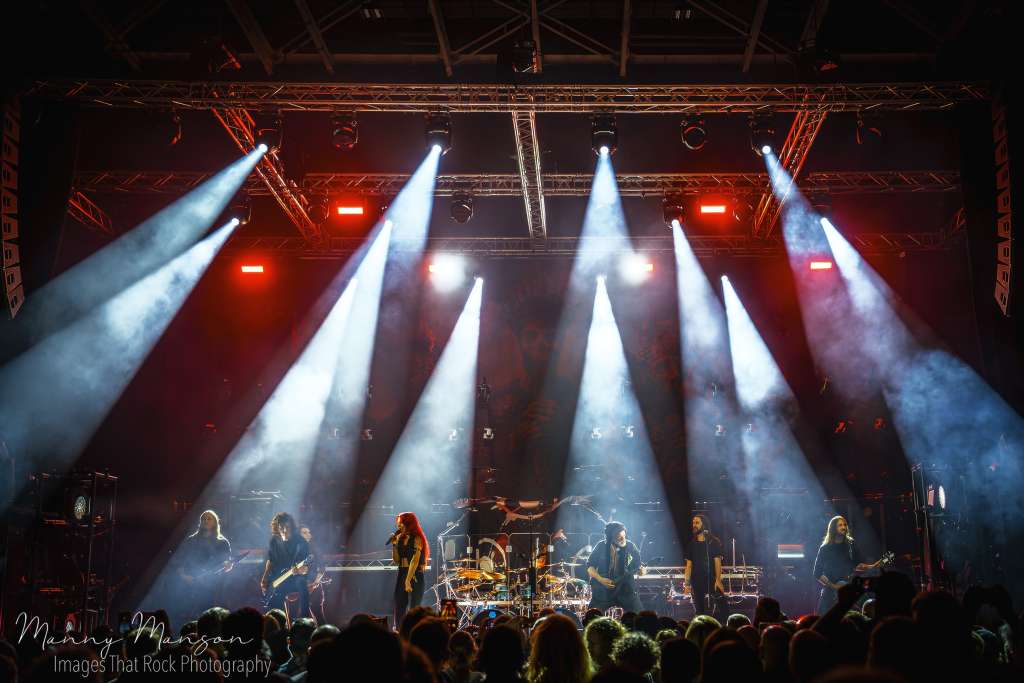
The crowd exhales. The lights shift. The spell thins but does not break. Two worlds have opened already, and the night is still gathering power for whatever comes next.
Amorphis
And by the time the third band walk into the lights, the air inside The Halls feels thick with myth and bone dust, because if Gatecreeper brought the scorched winds of the Sonoran desert and Eluveitie summoned the druidic spirits of ancient Helvetia, Amorphis arrive like a glacier breaking apart under moonlight, patient, old, immeasurably powerful, and carrying the weight of thirty-plus years of Finnish musical evolution in every note they exhale. There’s something ceremonial about the way they take the stage, as if the night has been building to this moment where folklore and melody and metal collapse gently into each other, and the crowd instinctively knows they’re in the presence of architects. Not scene warriors, not recent conquerors, but originators who took Finnish death metal’s frostbitten beginnings and coaxed it into progressive poetry, into something introspective and starlit without ever losing the heaviness pulsing at its core.
Amorphis were always boundary walkers, coming from that early ’90s wave where Finland was forming its identity in metal and yet they immediately felt too wide-eyed and imaginative to stay inside one box. From the primordial growl of The Karelian Isthmus, through the progressive renaissance of Elegy, into the melodic rebirths of Eclipse and Silent Waters and the symphonic, spiritual sweep of Queen of Time and Halo, they became storytellers first and genre second.
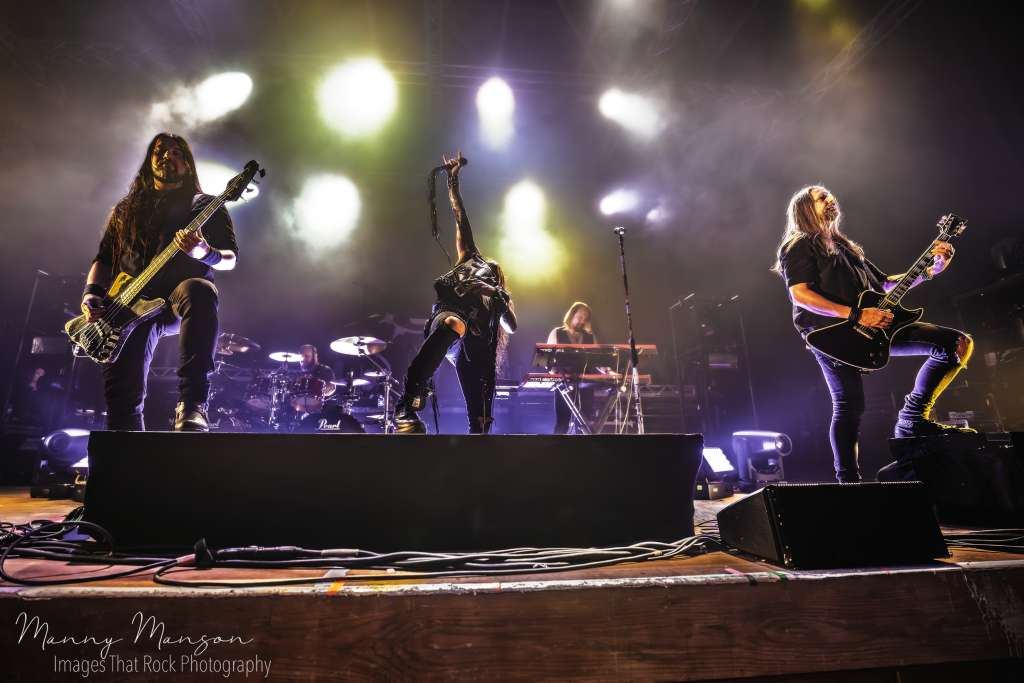
They didn’t chase scenes, scenes chased them. Tonight, they stand here as quiet titans, sages rather than showmen, and when Bones, from the latest offering Borderline, opens the set, it isn’t explosive but inevitable, unfolding in a churn of thick guitars and melancholic grandeur as Tomi Joutsen’s voice, that extraordinary dual-nature instrument, one-part ancient roar, one part wounded angel, cuts through the room like ancestral memory rising from dark earth. It’s a song about identity and the human soul stripped to its hard truth, and the way the band move, understated, unified, gazes inward, feels like they’re performing a ritual more than a gig.
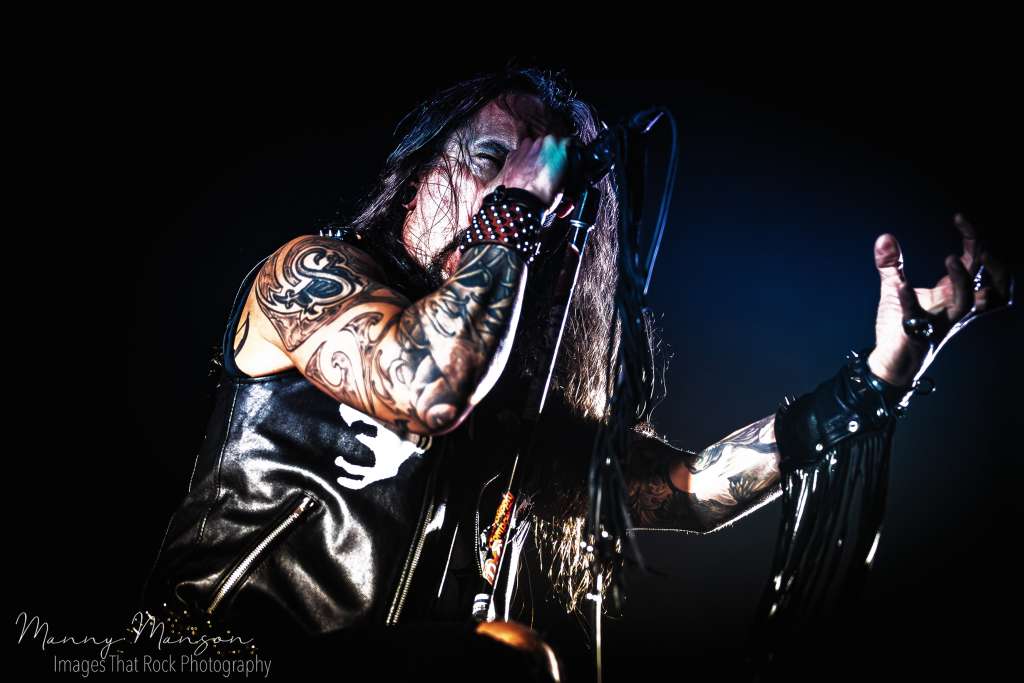
There’s barely time to breathe before Silver Bride sweeps in, all shimmering melody and spiritual ache, that unmistakable Kalevala mysticism woven through every note. It’s the song that, in 2009, reaffirmed Amorphis as masters of melodic progression without softness, a hymn to renewal wrapped in soaring hooks and ancient sadness, and here it lifts the room like mist off a lake at dawn. Esa Holopainen’s lead lines rise and fall like northern sky colours, effortlessly melodic yet carved from something older and colder than modern metal fashions, while rhythm guitarist Tomi Koivusaari, a founding member, a tie to their earliest, grit-covered death metal days, stands like a monument, grounding every ethereal layer with weight and earth.
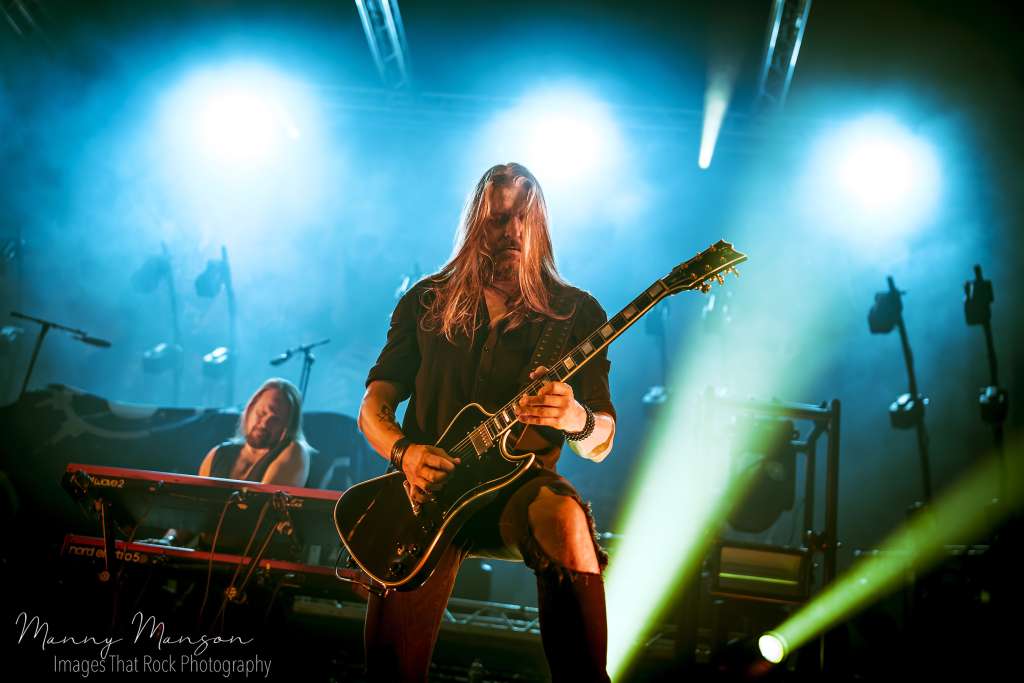
Wrong Direction turns things darker again, that pulsing heartbeat-rhythm and philosophical bite sending the set deeper into Amorphis’ fascination with fate, human blindness, the cost of misguided paths. There’s always been this literary soul to the band, songs not just about myth, but using myth to dissect human nature, and live, that introspection feels heavy in the best way. Santeri Kallio’s keys glow like cathedral glass, atmospheric, dreamlike, while Olli-Pekka Laine’s bass curls beneath everything like a river under ice.
Then The Moon arrives, and suddenly the crowd are moving in that slow, reverent sway reserved for songs that feel vast. You can hear the maturity of Halo here: the band embracing the cosmic, the ancient and infinite, blending folk cadence, prog expansiveness, and metal muscle with such deftness it feels instinctual. Tomi’s clean vocals are almost fragile, and when he switches to that deep, resonant growl, it’s like an old god waking, a reminder that this beauty has claws. Drummer Jan Rechberger, another tie to their earliest form, plays not like a timekeeper but like a narrator, every roll and shift a punctuation mark in the story.
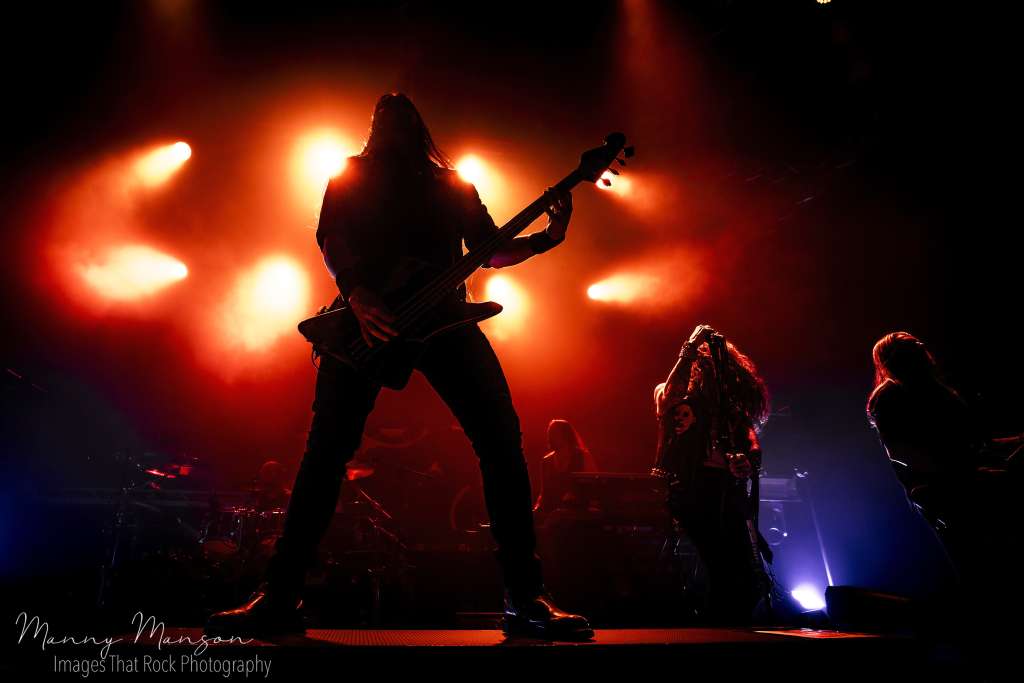
Dancing Shadow follows, the second offering from Borderline, and there’s movement now, hips and shoulders swaying, that hypnotic swing to the riffs cutting through the ambient introspection of the previous tracks. This is Amorphis as mystic travellers, still heavy, still monumental, but fluid, alive, almost ritualistic in rhythm. It’s music with ancient bones but modern blood.
When Death of a King lands, the folk roots crackle through, that serpentine melody line, that tribal pulse, that sense of a lament sung to a cold dawn sky over old stones. It was a defining moment in the Under the Red Cloud era, a statement that their devotion to Kalevala myth and Finnish folk influence wasn’t nostalgic, but fuel. The crowd respond like they’ve been waiting for it — arms rising, voices merging, the whole room caught in that ancient-meets-modern trance they do better than anyone.
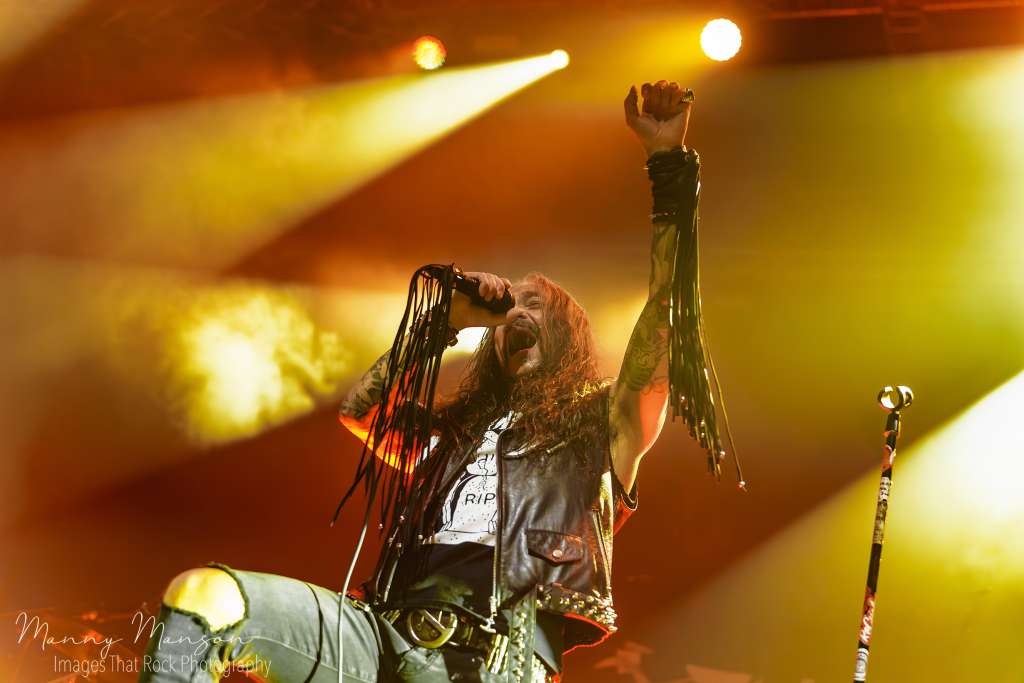
And then comes the roar for Black Winter Day, because Wolverhampton knows what this song represents: a turning point not just for Amorphis, but for European melodic metal as a concept. From Tales from the Thousand Lakes, the album that cracked open melodic death metal’s heart and filled it with folklore and melancholy instead of rage, it arrives still cold, still bleak, still beautiful. The keys cut through icy and mournful, the guitars buzz like winter wind, and Tomi channels the spirit of every era at once — not imitating Pasi Koskinen or the young death-roaring Koivusaari, but honouring the lineage through presence rather than imitation. It’s living history, played not like a throwback but like an eternal chapter.
House of Sleep breaks the tension like a hearth-fire after a snowstorm. Warmth floods the room, voices rise in that unmistakable chorus, and suddenly you remember that Amorphis aren’t just revered, they’re loved. This is one of the great metal sing-along moments of the 2000s, and here it feels communal, healing, like a folk song the crowd always knew even if they first heard it twenty years ago on Eclipse.
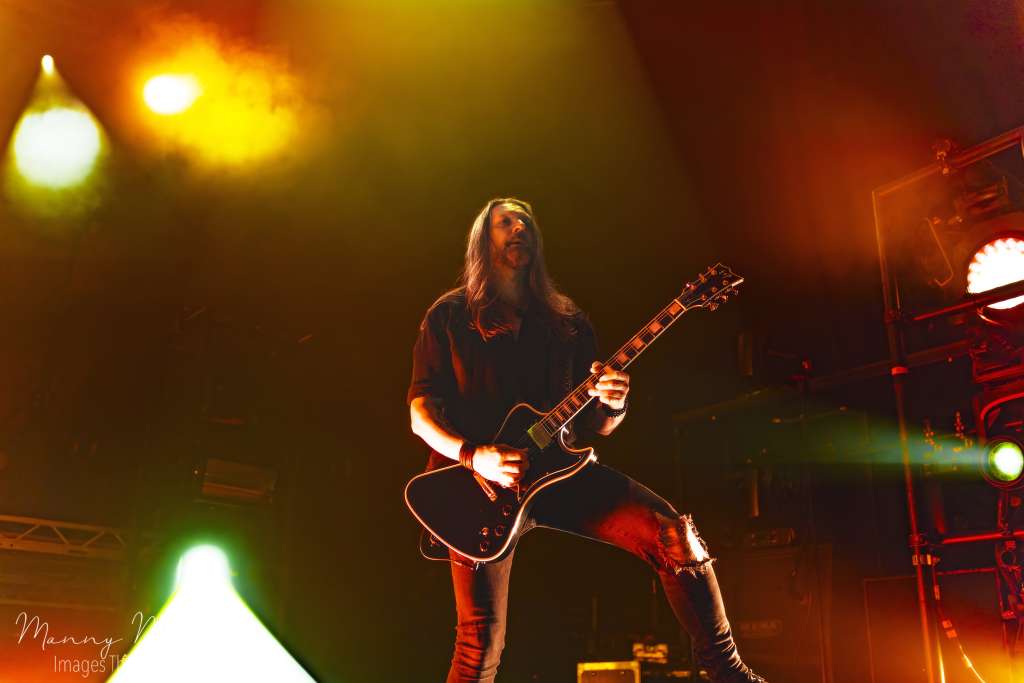
And then, with no fanfare, no theatrics, they close with The Bee, a choice that shows confidence and devotion to the present, not the past. It swarms and spirals, buzzing riffs dissolving into celestial keys, that refrain about the cosmic order vibrating through the floor. This is Amorphis at full maturity: still searching, still dreaming, still rooted in soil and star and sorrow and story. The ending crashes like the heavens falling, and then hangs in the air like breath in winter before fading into a hush.
When the stage lights dim and the band leave, there’s no wild frenzy, instead there’s that rare, deep stillness audiences only make when they know they’ve witnessed something sacred. Three acts into the night, and the journeys already crossed deserts and pagan forests and now the ancient lakes and dream-fields of Finland, each band carving their own myth.
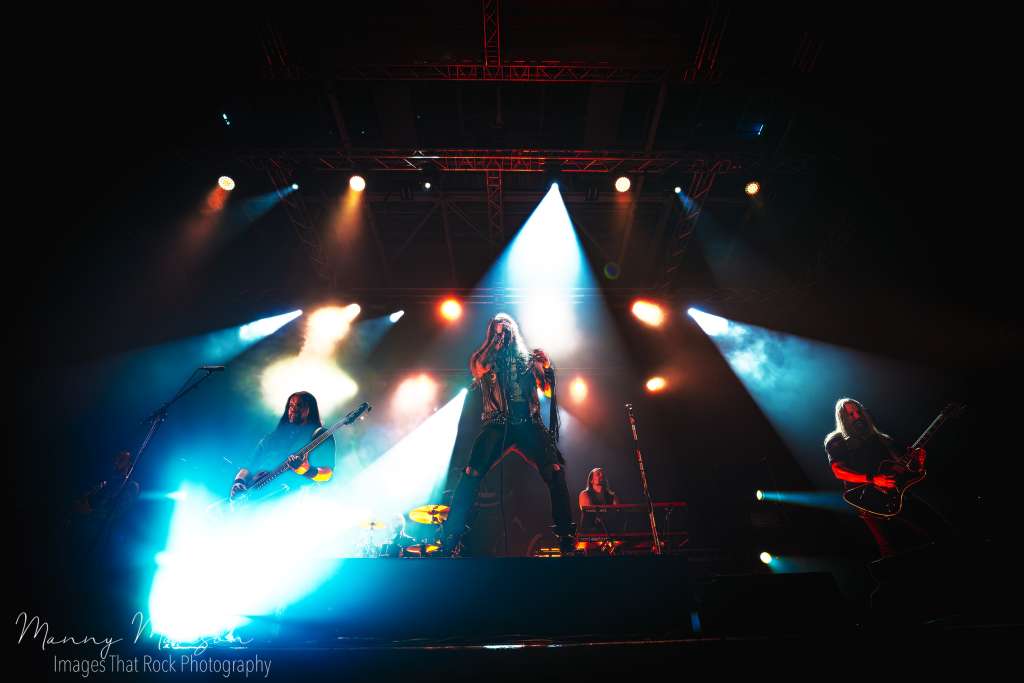
But Amorphis didn’t need violence or chaos or grandstanding. They simply existed, like mountains do, and the room bowed to the weight of years and stories and sound carried with quiet conviction
And as the crowd exhales, you realise something: this wasn’t nostalgia, and it wasn’t spectacle, it was a chapter from a saga still being written, handed to us not as entertainment, but as inheritance. And Wolverhampton, for a moment, felt like the oldest place on earth.
Arch Enemy
The room has already lived three lives tonight, scorched by Gatecreeper’s desert-born hardcore death, carved and sanctified by Eluveitie’s ancient pulse of wood, wind, and warrior ghosts, and lifted into snowfall-silence and star-drenched Nordic thought by Amorphis. But when the lights go black this final time, there’s no hush, no reverence, no mystic anticipation, there’s only a low rolling roar, like a beast stirring, like steel drawn from scabbard, like the air itself tightening in fear. Because this is not myth now, not folklore, not sorrow or memory. This is Arch Enemy. And when Arch Enemy enter a stage, they do not offer transcendence, they bring dominion. The temperature shifts. The walls tighten. The audience becomes an army waiting for orders.
The lights fell harder this time, not a descent but a plunge, and the air in The Halls felt electrically charged, like the crowd somehow knew that everything before this moment had been a pre-battle ritual. We’d been tested, broken in, baptised in blasts and folk storms and Finnish melancholy; now came the main event, the Swedish melodic death metal war machine formed in 1995, rising out of Halmstad like steel forged under frost-bitten skies, Arch Enemy.
For thirty years they have evolved, sharpened, and shed skins, from the Johan Liiva era into the defining roar of Angela Gossow, and now into the commanding reign of Alyssa White-Gluz, who brought not only another chapter but a seismic recalibration of modern extreme metal stage presence. Michael Amott had long been the architect, the crimson-haired riff alchemist with one foot in Carcass history and the other permanently planted in the future, and now with Daniel Erlandsson behind the kit, a heartbeat both mechanical and human at once, and Sharlee D’Angelo prowling the low end like a Viking panther on bass, they were joined tonight by new guitarist Joey Concepcion, stepping into the shoes of Jeff Loomis, who departed recently to explore his own creative universe. Loomis left a legacy of fire, but Joey already feels like a blade seamlessly slotted into the Arch Enemy arsenal: technical, sharp, hungry, and reverently explosive.
Before bodies, before motion, before war cries, a hush falls, then, a familiar snarl of Jake E. Lee riffs slips from the PA, “Bark at the Moon,” tongue-in-cheek, playful misdirection, Jake e Lee’s riffs slip from the PA, the last playful wink before the storm. It rolls straight into the taped “Set Flame to the Night,” that the opening instrumental, cinematic surge that has opened veins and tours since Will to Power, a pulse rising through the room like war drums calling ancient armies awake. And then, the curtain. “Pure Fucking Metal”, towering, silhouettes forming behind it, the band already locked in, forming in shadow like spirits being summoned.
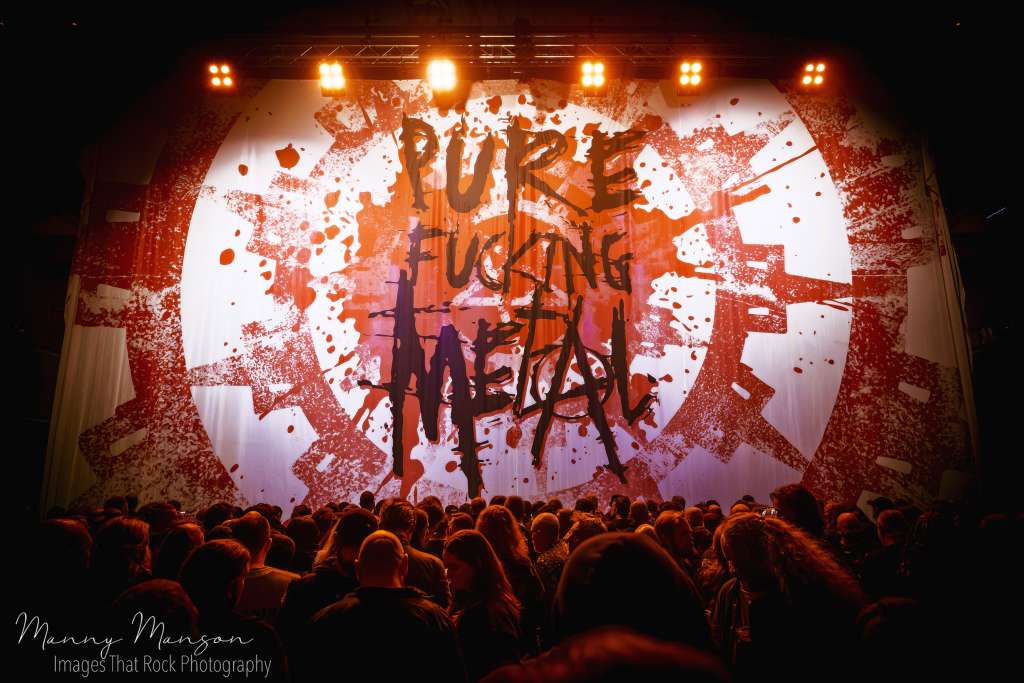
You don’t see them; you sense them. And then the opening stabs of “Deceiver, Deceiver,” the first strike from the 2022 album Deceivers, slicing through Wolverhampton like a guillotine on rusted chains. The silhouettes lunge, guitars carving the air, Alyssa’s shape like a Valkyrie behind the veil, crouched, coiled, predatory. The song’s opening hits, and mid-roar, the curtain isn’t raised, it falls, drops like a severed head, and the band burst into view in a detonation of white strobes and smoke-cannon thunder.
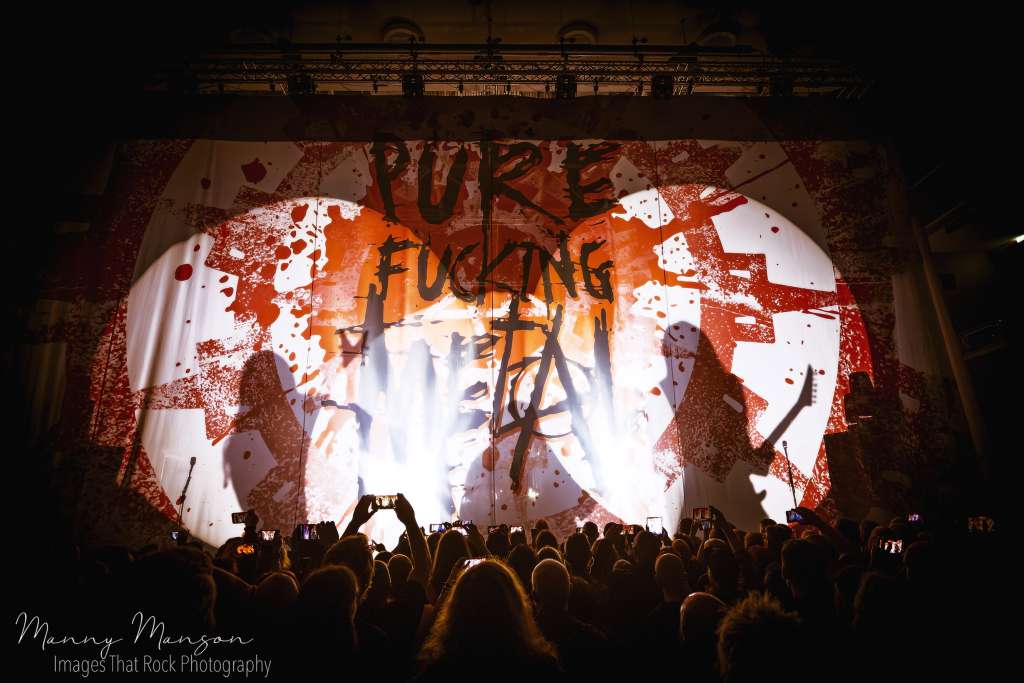
The burst of light and volume so physical you feel it in your chest cavity. Alyssa’s growl cuts the venue like serrated glass, a banshee commander unleashing the night, her blue mane flying, one boot on the monitor, fist raised like she’s summoning the pit into existence itself. The tremolo lines from Amott and Joey duel and weave, melodic and murderous, locked in twin-harmonic attack — sharp, biting phrasing, razor precision, while Erlandsson’s drums rumble like rolling armour lines. Alyssa commands the front like a general in full charge, knees bent, core braced, every lyric a bellow of war truth. It’s not a welcome. It’s a summons, a declaration: this is a siege. Wolverhampton answers.
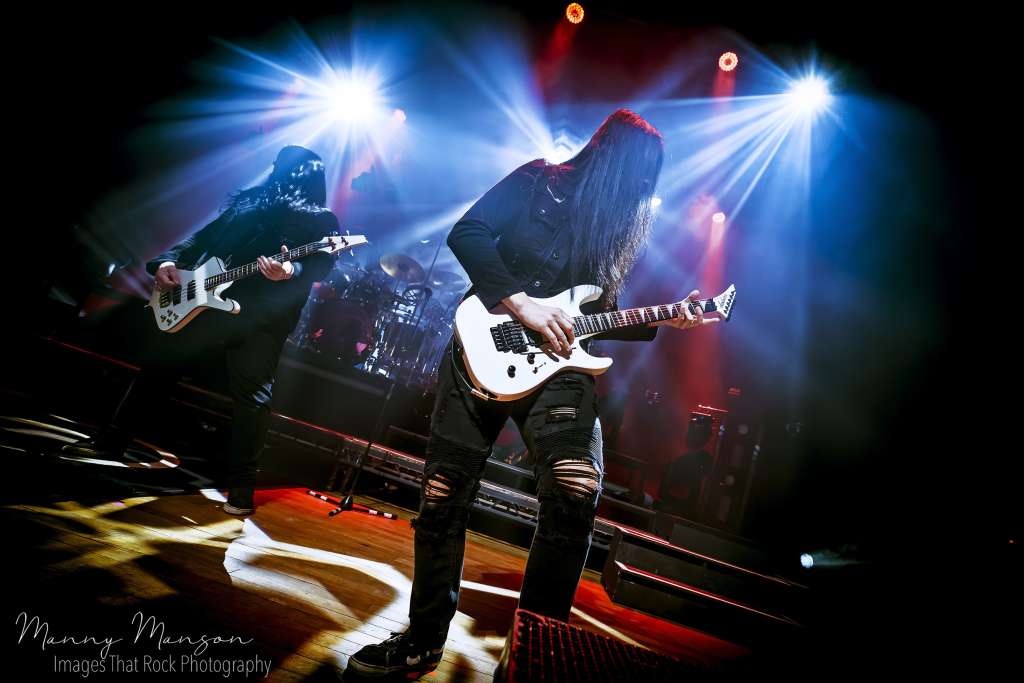
Barely a breath before they lunge into “Ravenous” from 2001’s Wages of Sin, the Gossow arrival era, a slab of pointed aggression, all serrated riffs and sharpened intention. Alyssa honours, never imitates; she brings her snarl into that legacy like a bearer of royal blood reclaiming ancestral land. Her gutturals sounding like they’ve been aged in anger. Sharlee swings the rhythm like a wrecking ball, his bass punches through the chest cavity, weighty, relentless, the pulse that both grounds and drives every foot in the room, and you feel the crowd tighten their formation, bodies shoulder-to-shoulder, fists rising, voices torn and raw shouting the chorus: “I am ravenous!” It’s pure, old-school Arch Enemy fury, the sound of the world before polish, before light, when Sweden’s melodic death scene was a forge of rebels.
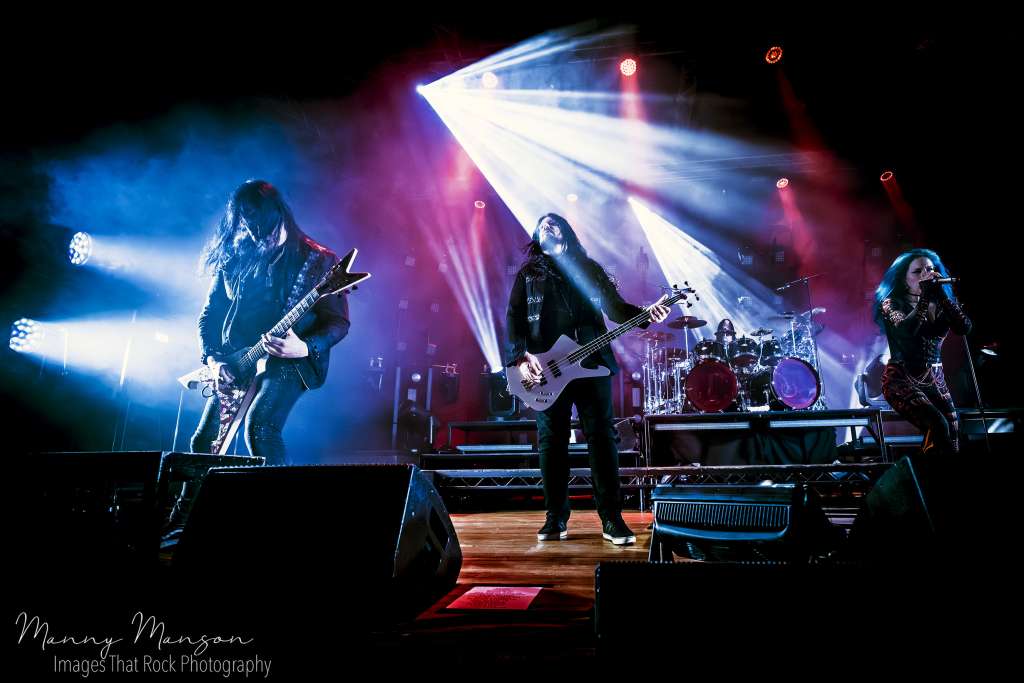
“Dream Stealer” follows, yes, Dream Stealer, one of the standout assaults from 2025’s Blood Dynasty, the brand-new era, the ink still wet on its banners. The riffs here feel like they grew teeth in the dark; a snake-coil verse explodes into a chorus that soars without mercy, not pleading or pleading, commanding. Joey’s leads shimmer like liquid fire, proving immediately why he’s here. Alyssa stalks the stage, crouching at the edge of the pit, one hand clawed, as if dragging the crowd into the song and daring them to keep up. When she drops into that mid-section chant cadence, every head in the room snaps in rhythm, as if drawn by invisible wire.
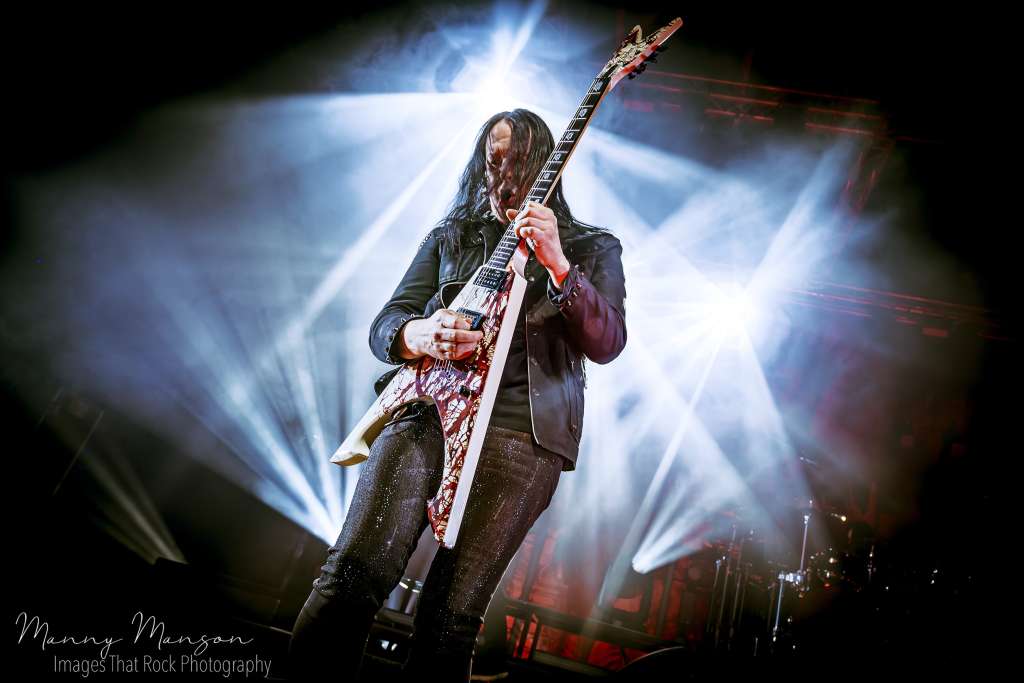
And then the title track, “Blood Dynasty”, the fresh crown jewel of an album released only in March 2025, and it lands like a statement of evolution. The guitars are surgical, layered, sweeping, Amott’s writing matured into something grander, more imperial, a melodic death metal empire anthem. The chorus crackles with a regal menace, Alyssa’s delivery alternating between throat-ripped dominance and almost ritualistic cadence. Live, it feels ceremonial, like we are present not just at a concert but at the coronation of a new phase, melodic and brutal in equal measure, the dynasty born in feedback and sweat.
They pivot with the seasoned precision of assassins into “War Eternal” from 2014’s War Eternal, the song that heralded Alyssa’s tenure. It hits like a flag raised on a battlement, and she sings it now not as a newcomer but as a ruler fully enthroned. The roar of “I am who I am!” becomes less lyric, more affirmation, an entire room shouting with her. Its marching rhythm, that relentless forward momentum, turns the venue into a battlefield rally. Bodies surge, heads whip, and phonelines of melody cut clean through the distortion like glowing runes.
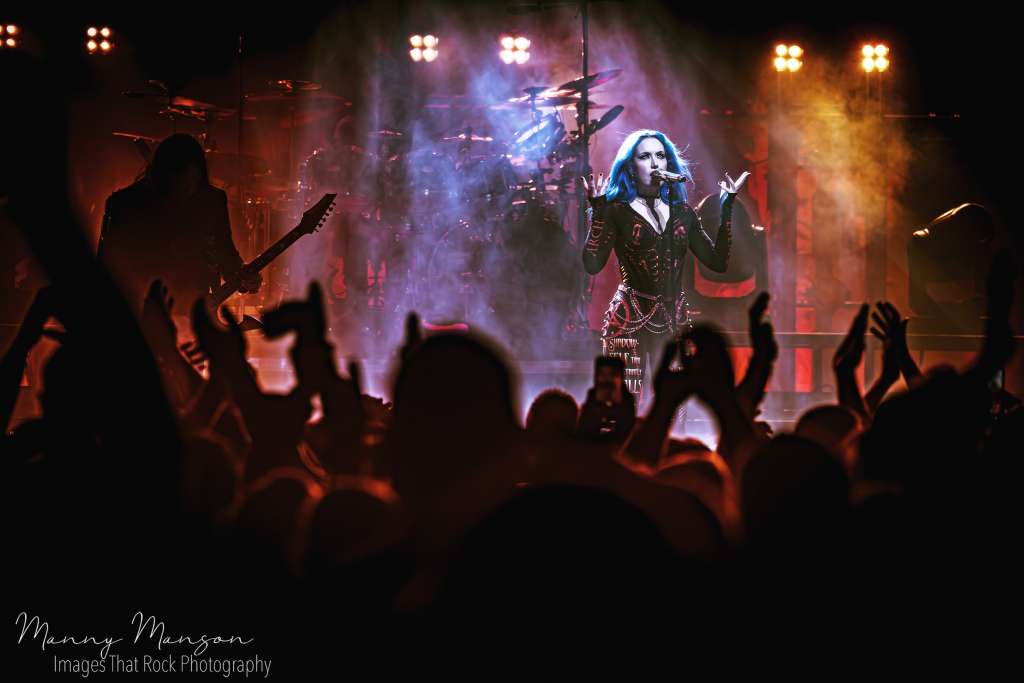
“My Apocalypse” detonates next, from 2005’s Doomsday Machine, and Erlandsson turns the floor into a seismic event. Joey digs into those signature Loomis lines, sharp and mechanical, riffs layered like rotating blades, and Alyssa descends into lower growls like she’s scraping the earth with her throat. There’s something primal here, old Arch Enemy and new Arch Enemy fused into a single living weapon. This is Arch Enemy’s industrial war machine side, the band as steel, as piston, as flesh turned to armour. Crowd surfers begin cresting over heads, the pit a whirlpool of exhilaration and sweat.
“Illuminate the Path,” another blazing jewel from Blood Dynasty, catches everyone with its sweeping leads and explosive chorus, melodic, soaring, triumphant Alyssa rides the stage lights like she’s surfing electricity, windmill-headbanging through crescendos as arms rise like spears from the crowd. The harmony solo section between Amott and Joey feels like two swords clashing mid-battle, then locking in mutual respect. If tonight is a proving ground, Joey passes every measure.
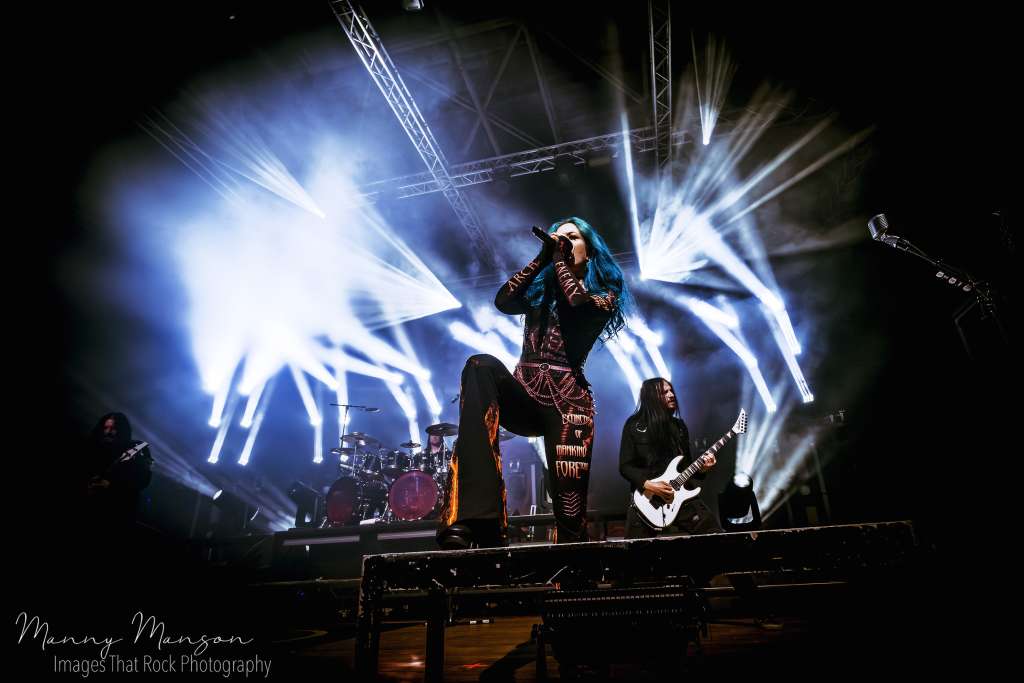
“Liars and Thieves,” still deep in Blood Dynasty territory, hammers home how confident these new songs already feel. It hits like a hunt, predatory, stalking verses, blasting choruses. It feels like a manifesto against decay and corruption, There’s a swagger in Alyssa’s pacing, a ritualistic stomp that commands rather than invites. Pacing like she’s reading charges at a trial where every enemy is already condemned. When she growls each syllable like she’s spitting judgement, the room moves in jagged synchrony, a tide of fists punching time.
Then a hush turns sharp, anticipation spikes, and Arch Enemy unleash the triumphant isolation anthem “The Eagle Flies Alone” from Will to Power (2017). This is Alyssa’s anthem, her independence manifesto, and the crowd knows every word. It’s the closest this band gets to a hymn, triumphant, defiant, undeniably melodic while still ripping skin from bone. She holds the mic out on the final line and The Halls doesn’t sing it, it roars it, hundreds of throats declaring their own autonomy.
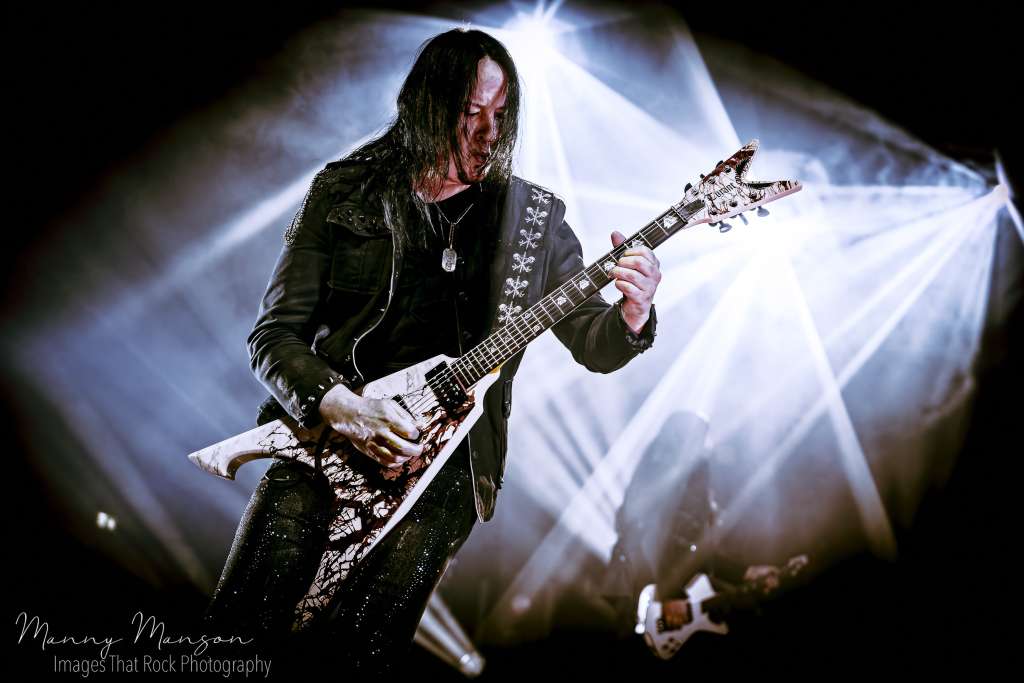
Then “First Day in Hell” from Will to Power, it feels like Arch Enemy are peeling back the gates of the inferno and daring you to step through all Middle Eastern scales and funereal stomp, ritualistic and ominous, dripping atmosphere. Alyssa rasps like sandstorm winds over bones, with that serrated roar that sounds equal parts fury and lament. Amott and Conception carve out ominous, winding melodies that drip with Middle Eastern-tinged melancholy, their guitars almost chanting like doomed priests as Sharlee D’Angelo’s bass rumbles beneath like tectonic plates shifting under fire. Daniel Erlandsson’s drums crash in ritualistic cadence, turning every snare into a war drum summoning something ancient. Tension coils again. blackened grooves, crushing weight, riffs like rusted chains being pulled taut. The atmosphere feels sulphuric, biblical in its disdain. The lows in Alyssa’s voice scrape bone. each note is soaked in tragedy and triumph, and as the chorus rises like smoke over scorched ruins, you realise hell isn’t chaos here, its order, purpose, and a sharpened will forged in flame.
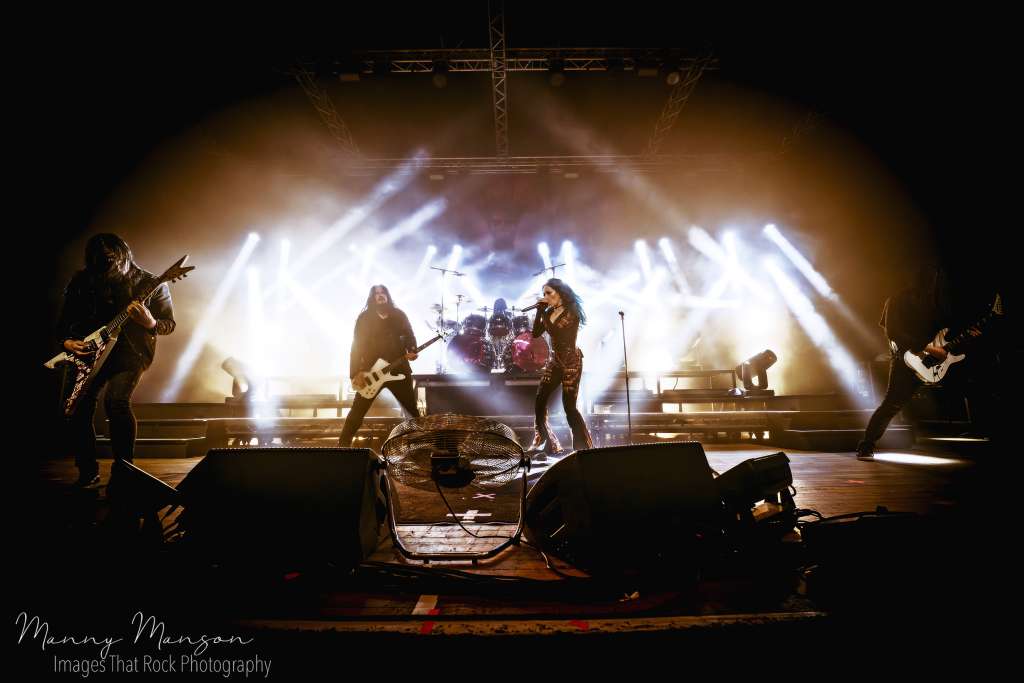
A momentary ghost rises, the taped “Saturnine” floats like a mournful interlude, ethereal, the battlefield at dusk before the final charge, and people catch breath as phones shimmer like embers among the smoke. The charge comes with “Sunset Over the Empire” from Deceivers, a storm of syncopation and precise violence, Alyssa pacing like a general, surveying troops, hammering her fist to her chest as if commanding hearts to match tempo. That thrash-leaning undercurrent sends pits spinning again. That marching cadence, that sharpened fury, the empire is crumbling, and Arch Enemy are narrating its fall with regal contempt. The lighting goes orange, apocalyptic, cities burning, civilizations collapsing in rhythm.
“No Gods, No Masters” from Chaos Legions (2011) is a riot manifesto live, it hits like a sermon delivered with flamethrowers. The slogan becomes physical, screamed back like rebellion incarnate, the guitar harmonies gilding rebellion with grandeur. Sharlee’s bass is a tank engine, Daniel’s kick drums relentless, fists in the air across the room. It’s secular rebellion, pure and primal, a refusal to kneel.
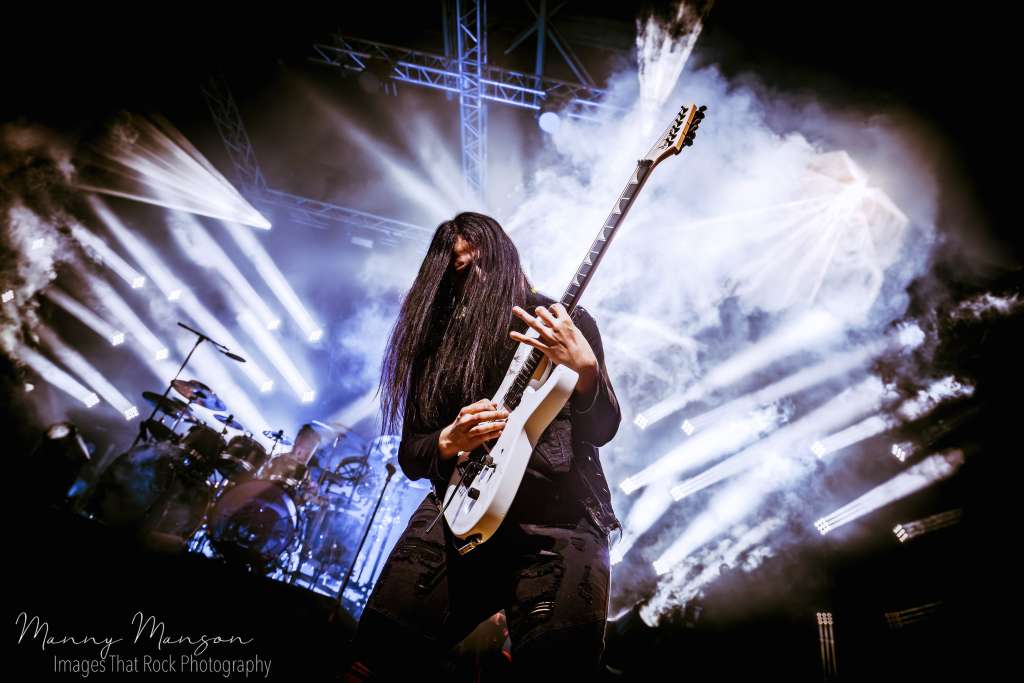
The main set closes with “Avalanche” from War Eterna, it crashes like its name, sweeping, orchestral in undertone, all momentum and frozen fury. It’s a title that always feels like it describes the crowd more than the song, unstoppable, crushing, consuming. Michael’s melody rings like alpine frost, Joey mirrors it with molten precision, Alyssa throws her whole frame into every word, every limb an extension of aggression and control. When she leans back and bellows into that final section, it’s a sustained growl so fierce it shakes breath loose from lungs. the room is hers, utterly. The lights cut. The band vanish. The roar does not fade, it builds.
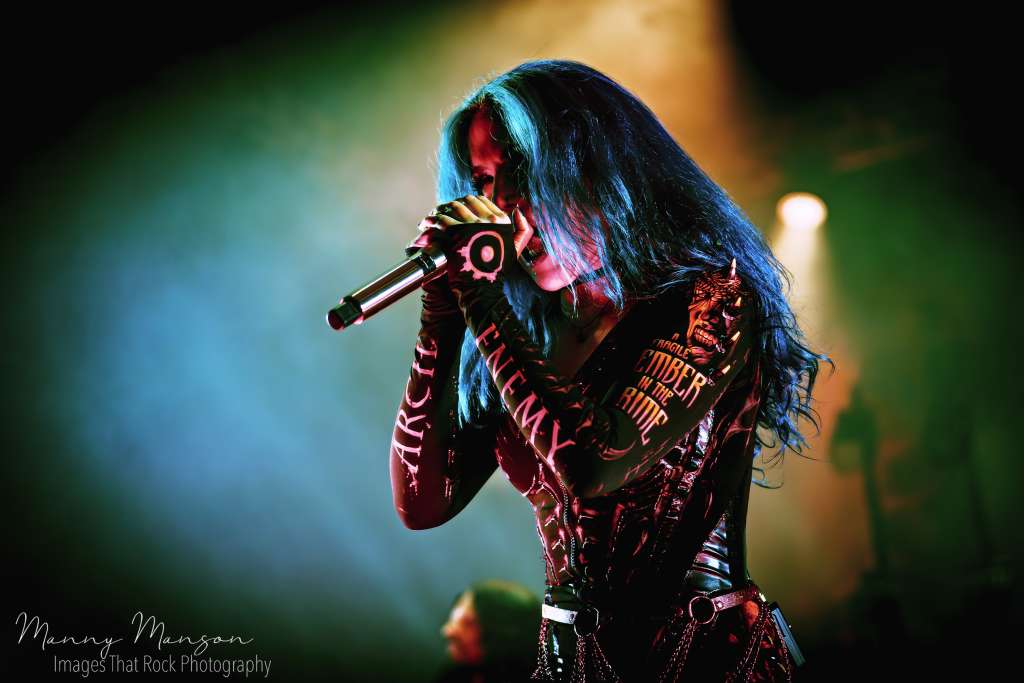
Encore. When they return, they don’t detonate immediately they glisten. Darkness. A hush, then “Snowbound” from Wages of Sin, instrumental, beautiful, a frozen hymn of clean guitars, a crystalline breath in the storm, the stage bathed in ice-white light as fingers dance and shimmer on fretboards, played with elegance, a moment of crystalline beauty in a night of war. Michael and Joey stand shoulder to shoulder, exchanging phrases like siblings in art, every note clear as glass. You can feel the years, the legacy, the continuity.
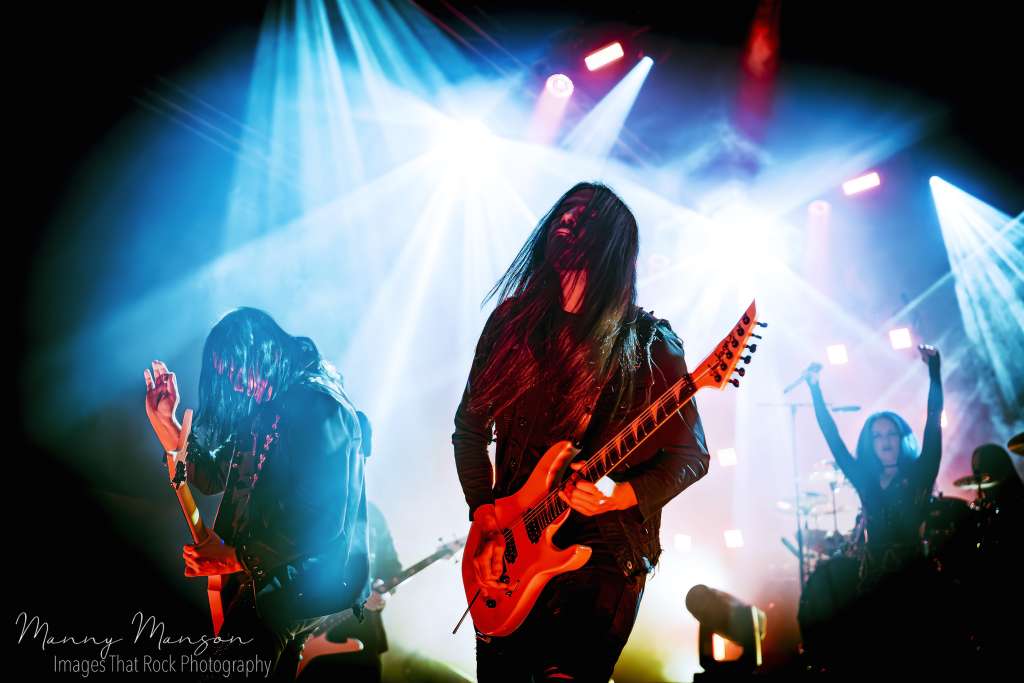
And then the detonation incarnate: “Nemesis” from Doomsday Machine explodes. Wolverhampton erupts. The room becomes a singular organism, and when that infamous line lands, “We are one”, it doesn’t feel symbolic, it feels literal. This is the modern metal battle cry carved into steel: “We are one — and one is all!” (Theres a fist pumping DORO moment in there somewhere) The crowd becomes a single organism, throats raw, hearts hammering, bodies surging as though chasing something primeval. Alyssa stands like a queen of war atop her monitor, both arms extended, owning every atom of the moment.
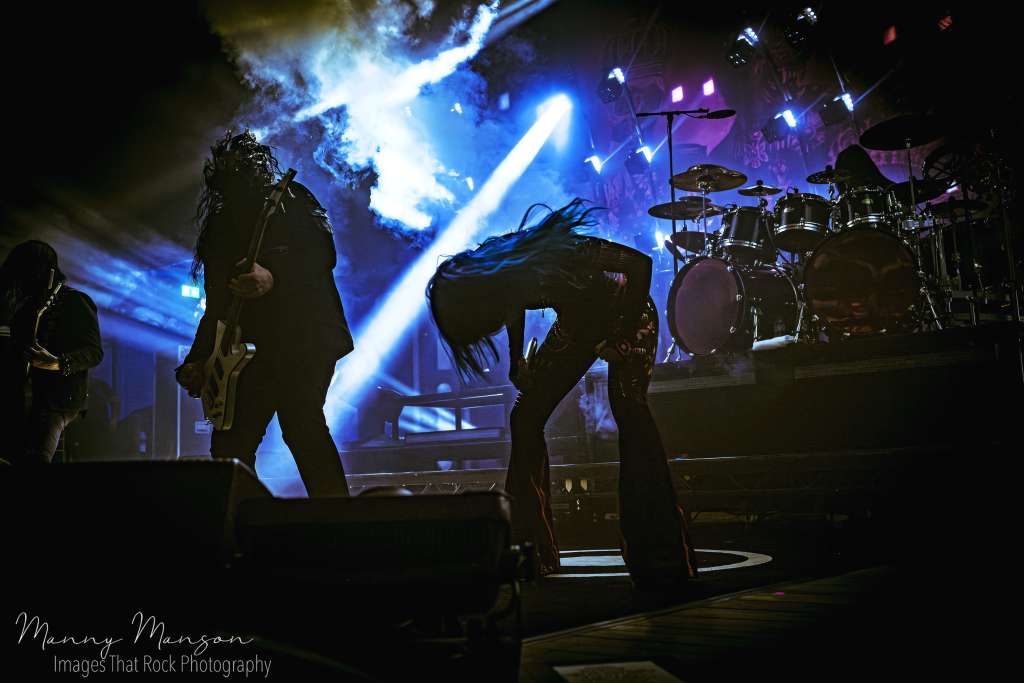
Finally, they sever the night with “Fields of Desolation”, a ghost from the beginning, the outro of Black Earth, reaches all the way back to 1996, full circle to the beginning, tying decades of evolution into one final haunting release. The primal melodic death roots, raw, beautiful, furious in a young way that still feels urgent. Alyssa channels the band’s past without ever stepping out of her own era; she is continuity and evolution made flesh.
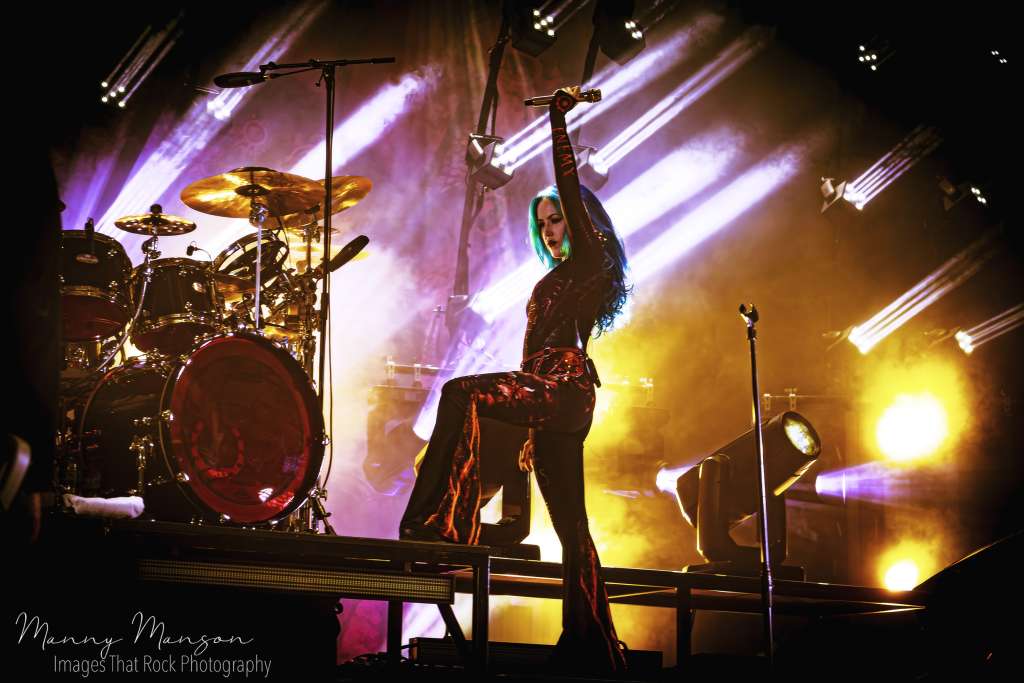
The stage empties. The hall breathes out like a wounded dragon. And then the final exhale, Enter the Machine, followed by Vox Stellarum, subtly plays over the PA, mechanical, regal, prophetic. Mechanically cold, piano keys echoing around the Hall the last note long, drawn out, haunting, a reminder that the Arch Enemy war engine never really stops, it only powers down long enough to sharpen blades.
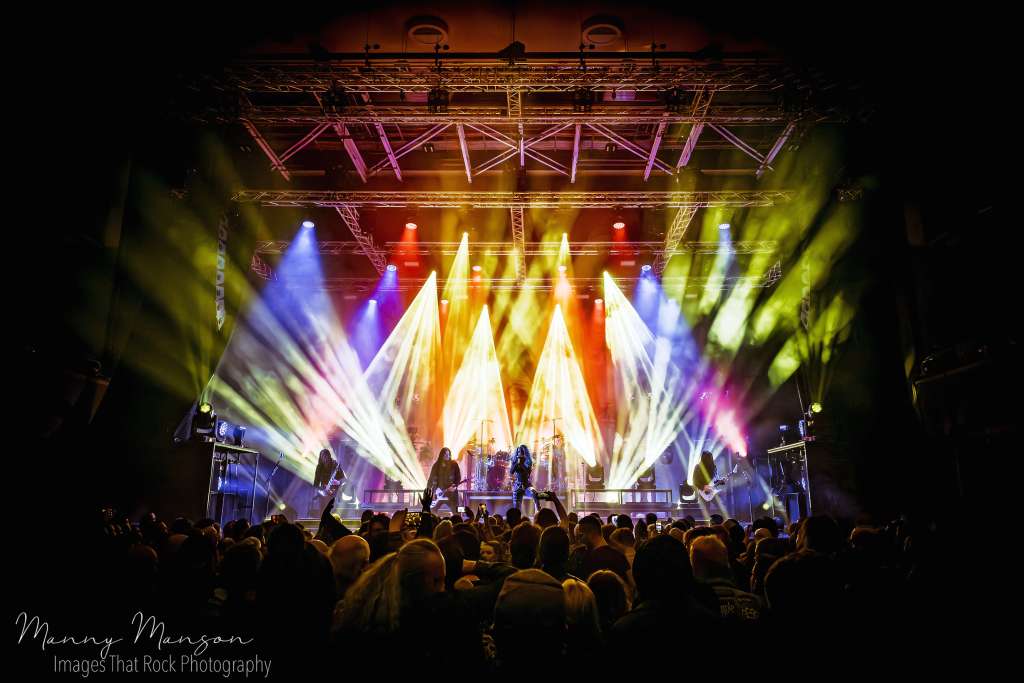
When the house lights finally lift, people don’t speak immediately; they breathe, sweat steaming like they’ve survived a ritual. Tonight was about a dynasty staking its claim, a door torn open, a lineage honoured and reborn in real time. Arch Enemy didn’t simply put on a performance, they conquered, album by album, era by era, song by sharpened song, and under the crushing roar and blinding lights, they stand, sweat-smeared, grinning, exhausted, because tonight didn’t just end, it passed a torch. Gatecreeper burned the ground. Eluveitie summoned the old gods. Amorphis communed with the eternal. And Arch Enemy, they claimed the throne, they claimed their seat at the top table. A dynasty crowned in blood, steel, melody, revolution, and a crowd that didn’t just witness it, but participated in the coronation.
Tonight, the empire did not fall.
It recruited!


